Blog
This is my personal blog written since October 22, 2016, with topics that range from research, to music, to announcements, to resources, to teaching, among others. I also write and co-write for other blogs. If interested, here’s a list of more than 100 blog posts that I’ve been involved in, which are classified under the categories of AI and music, music technology/SMC, HCI, design, and research methods. You can also read my blog post 100 blog posts.
-
Reflecting on 2025
 Anna Xambó performing at the Sala Beckett, ICLC 2025 (May 29, 2025). Photo by Miquel Martinez. This year has been my second year at the Centre for Digital Music (C4DM), Queen Mary University of London (QMUL) as a Senior Lecturer in Sound and Music Computing. It is also the second and last year of the AHRC-funded Sensing the Forest project, which I am the principal investigator. We are now concluding this chapter by releasing code repositories and datasets; analysing the data; and producing the final research outputs. It has been an amazing and intense journey! This is also the year when I started the research lab Computational Sonic Arts Laboratory at C4DM/QMUL. Following my previous year reflections (2020, 2021, 2022, 2023, and 2024), in this blog post, I reflect on how this year has been in terms of key activities and outputs, as well as discuss my intentions for 2026. Research In 2025, my research...
Read more
Anna Xambó performing at the Sala Beckett, ICLC 2025 (May 29, 2025). Photo by Miquel Martinez. This year has been my second year at the Centre for Digital Music (C4DM), Queen Mary University of London (QMUL) as a Senior Lecturer in Sound and Music Computing. It is also the second and last year of the AHRC-funded Sensing the Forest project, which I am the principal investigator. We are now concluding this chapter by releasing code repositories and datasets; analysing the data; and producing the final research outputs. It has been an amazing and intense journey! This is also the year when I started the research lab Computational Sonic Arts Laboratory at C4DM/QMUL. Following my previous year reflections (2020, 2021, 2022, 2023, and 2024), in this blog post, I reflect on how this year has been in terms of key activities and outputs, as well as discuss my intentions for 2026. Research In 2025, my research...
Read more
-
PhD Opportunity (QMUL S&E Underrepresented Group Studentships) - Collaborative Motion‑Based Hybrid Live Coding
 Image of Human-Robot Music Co‑Creation Connected
About the PhD position
A position for UK/Home eligible students from Underrepresented Groups is available on the topic of “Collaborative Motion‑Based Hybrid Live Coding”.
We are seeking prospective PhD applicants for a project on human–human and human–robot live coding performance and musical co‑creation via haptic communication. The research will investigate how a robot or a another human can perceive musical intent of a partner, generate its own “code” in real time, and perform in a shared creative environment. We are especially interested to see how this can be realised through motion features and haptic input.
Co-supervisors: Dr Ekaterina Ivanova & Dr Anna Xambó Sedó
Keywords: live coding, human-robot interaction, haptic input
Application Deadline
Application deadline: 28th January 2026
*Eligibility criteria and details of the scheme: https://www.qmul.ac.uk/eecs/phd/phd-studentships/se-doctoral-research-studentships-202627-for-underrepresented-groups/
How to apply: https://www.qmul.ac.uk/eecs/phd/phd-studentships/se-doctoral-research-studentships-202627-for-underrepresented-groups/
Interested? Contact us to discuss and tailor the topic to our joint interests.
Read more
Image of Human-Robot Music Co‑Creation Connected
About the PhD position
A position for UK/Home eligible students from Underrepresented Groups is available on the topic of “Collaborative Motion‑Based Hybrid Live Coding”.
We are seeking prospective PhD applicants for a project on human–human and human–robot live coding performance and musical co‑creation via haptic communication. The research will investigate how a robot or a another human can perceive musical intent of a partner, generate its own “code” in real time, and perform in a shared creative environment. We are especially interested to see how this can be realised through motion features and haptic input.
Co-supervisors: Dr Ekaterina Ivanova & Dr Anna Xambó Sedó
Keywords: live coding, human-robot interaction, haptic input
Application Deadline
Application deadline: 28th January 2026
*Eligibility criteria and details of the scheme: https://www.qmul.ac.uk/eecs/phd/phd-studentships/se-doctoral-research-studentships-202627-for-underrepresented-groups/
How to apply: https://www.qmul.ac.uk/eecs/phd/phd-studentships/se-doctoral-research-studentships-202627-for-underrepresented-groups/
Interested? Contact us to discuss and tailor the topic to our joint interests.
Read more
-
Open Call PhD Position Funded by China Scholarship Council
 Image generated using Craiyon AI. About the PhD position We are happy to announce an exciting PhD position to work on “Sonification techniques for understanding hidden processes of LLMs” at the Computational Sonic Arts Lab, Centre for Digital Music, School of Electronic Engineering and Computer Science, Queen Mary University of London, funded by the China Scholarship Council (CSC). Primary supervisor: Dr Anna Xambó Sedó Second supervisor: Dr Charalamos Saitis Topic: Large language models (LLMs) are a type of artificial intelligence program that can recognise and generate text, which are trained on huge sets of data with a complex network of hidden processes. This PhD topic explores sonification techniques of LLMs for a better understanding of the way they process the information. Can we treat LLM engines such as ChatGPT as a musical instrument and listen to its internal processes? Can sonification techniques help us to hear and see how the information is processed? Compared to...
Read more
Image generated using Craiyon AI. About the PhD position We are happy to announce an exciting PhD position to work on “Sonification techniques for understanding hidden processes of LLMs” at the Computational Sonic Arts Lab, Centre for Digital Music, School of Electronic Engineering and Computer Science, Queen Mary University of London, funded by the China Scholarship Council (CSC). Primary supervisor: Dr Anna Xambó Sedó Second supervisor: Dr Charalamos Saitis Topic: Large language models (LLMs) are a type of artificial intelligence program that can recognise and generate text, which are trained on huge sets of data with a complex network of hidden processes. This PhD topic explores sonification techniques of LLMs for a better understanding of the way they process the information. Can we treat LLM engines such as ChatGPT as a musical instrument and listen to its internal processes? Can sonification techniques help us to hear and see how the information is processed? Compared to...
Read more
-
My new lab
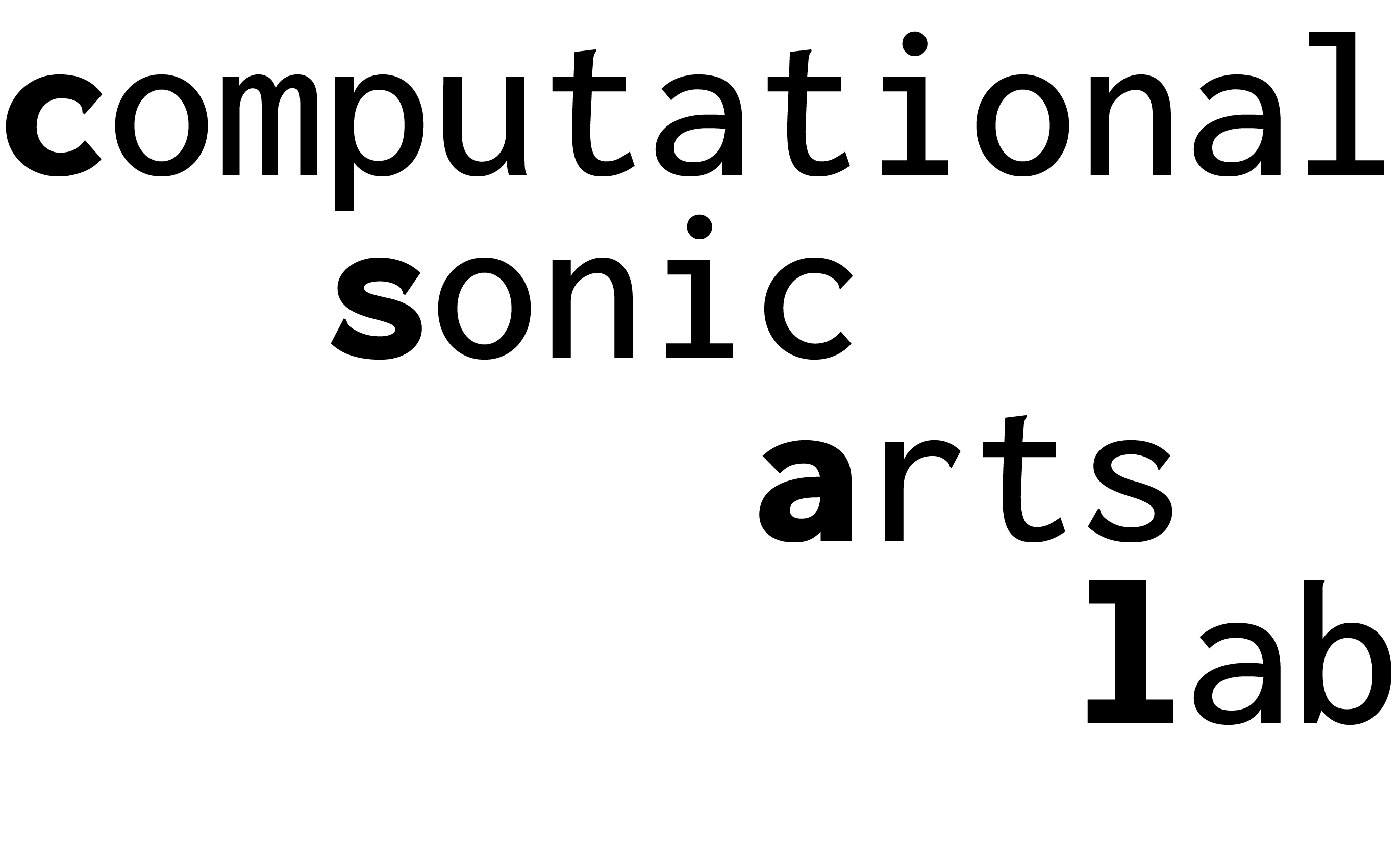 Computational Sonic Arts Laboratory logo I am very proud to announce that I have a research lab! The Computational Sonic Arts Laboratory (CSAL) aims to become a research hub in developing sustainable, inclusive, and forward-thinking technologies that transform how we create, experience, and understand music. The Computational Sonic Arts Laboratory is a research team based in the Centre for Digital Music (C4DM) at Queen Mary University of London dedicated to advancing the intersection of sonic arts and cutting-edge technology. The lab has been founded in 2025 as part of QMUL’s Centre for Digital Music. Rooted in principles of culture, creativity, and community, the lab explores sonic creativities and creative computing through innovative research in creative AI, music AI, and intelligent music systems. The vision of the lab is to bridge HCI, sound and music computing, and new interfaces for musical expression, by emphasising live coding, network music, and generative sound-based music. You can visit the...
Read more
Computational Sonic Arts Laboratory logo I am very proud to announce that I have a research lab! The Computational Sonic Arts Laboratory (CSAL) aims to become a research hub in developing sustainable, inclusive, and forward-thinking technologies that transform how we create, experience, and understand music. The Computational Sonic Arts Laboratory is a research team based in the Centre for Digital Music (C4DM) at Queen Mary University of London dedicated to advancing the intersection of sonic arts and cutting-edge technology. The lab has been founded in 2025 as part of QMUL’s Centre for Digital Music. Rooted in principles of culture, creativity, and community, the lab explores sonic creativities and creative computing through innovative research in creative AI, music AI, and intelligent music systems. The vision of the lab is to bridge HCI, sound and music computing, and new interfaces for musical expression, by emphasising live coding, network music, and generative sound-based music. You can visit the...
Read more
-
Open Call PhD Position
 Image generated using Craiyon AI.
We are happy to announce an exciting PhD position to work on “Nature-inspired computing for sound-based DIY approaches to creative AI” at the Centre for Digital Music, School of Electronic Engineering and Computer Science, Queen Mary University of London. You will be part of a vibrant academic community with access to state-of-the-art facilities and mentorship from experienced researchers.
Application deadline: 28th February 2025
Requirements: UK home student
How to apply
You can find more info here
For informal enquiries about the position, please contact me at a dot xambosedo at qmul dot ac dot uk
Read more
Image generated using Craiyon AI.
We are happy to announce an exciting PhD position to work on “Nature-inspired computing for sound-based DIY approaches to creative AI” at the Centre for Digital Music, School of Electronic Engineering and Computer Science, Queen Mary University of London. You will be part of a vibrant academic community with access to state-of-the-art facilities and mentorship from experienced researchers.
Application deadline: 28th February 2025
Requirements: UK home student
How to apply
You can find more info here
For informal enquiries about the position, please contact me at a dot xambosedo at qmul dot ac dot uk
Read more
-
Reflecting on 2024
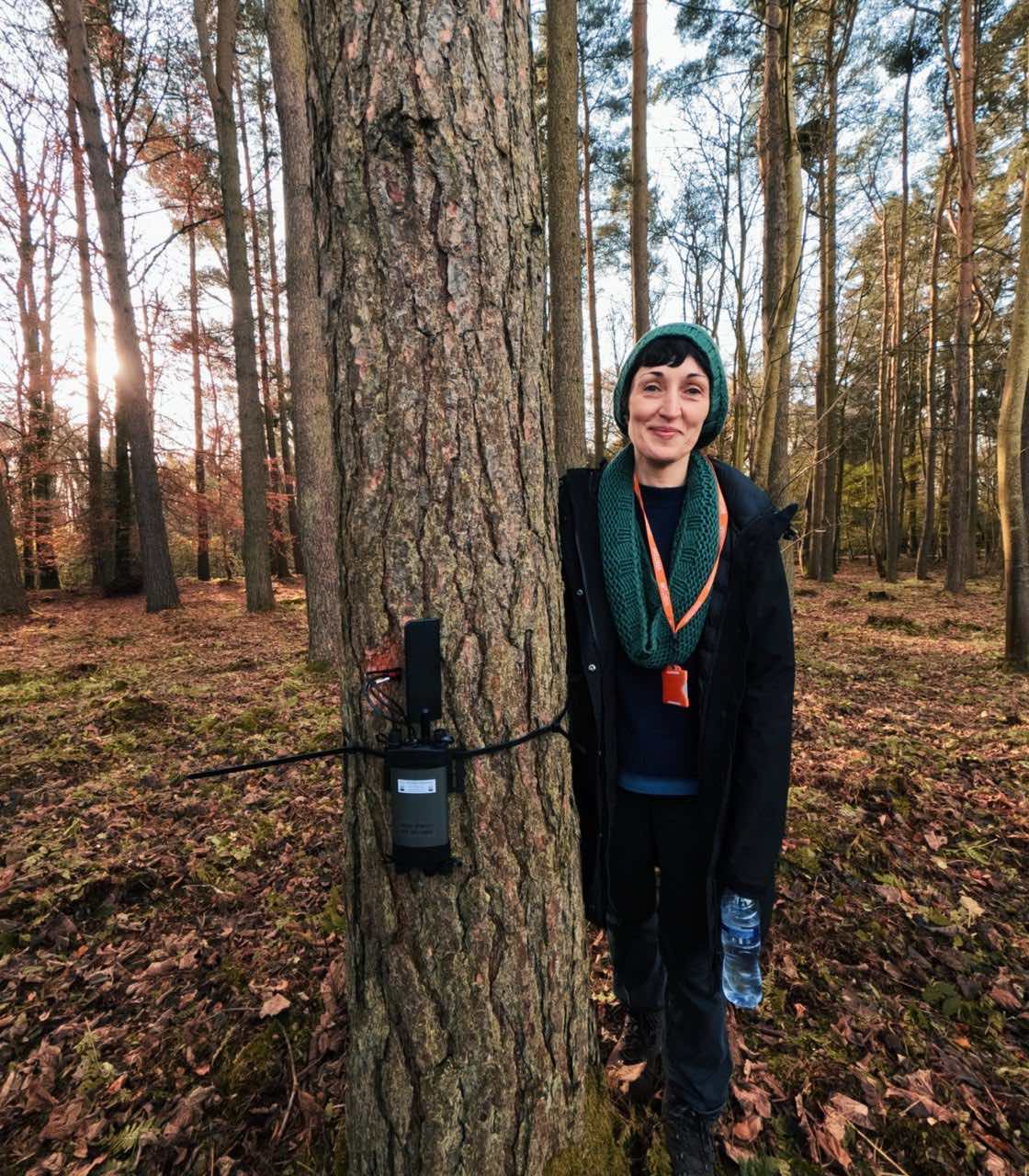 Anna Xambó at the AHRC Sensing the Forest Hackathon at Northern Research Station Edinburgh (November 13, 2024). Photo by Mahmoud Elmokadem. The date of this blog post, which was supposed to be published at the end of last year, tells already how busy it has been! It feels like time passes exponentially. Following my previous reflections on 2020, 2021, 2022 and 2023, in this blog post, I reflect on how this year has been in terms of key activities and outputs, as well as discuss my intentions for 2025. Research This year, my research work has mostly focused on transferring the AHRC Sensing the Forest from De Montfort University to Queen Mary University of London and on executing the work packages with the project team, which has taken most of my research time. There has been also time for writing. This year, I have been involved in two journal articles, a conference paper, an abstract...
Read more
Anna Xambó at the AHRC Sensing the Forest Hackathon at Northern Research Station Edinburgh (November 13, 2024). Photo by Mahmoud Elmokadem. The date of this blog post, which was supposed to be published at the end of last year, tells already how busy it has been! It feels like time passes exponentially. Following my previous reflections on 2020, 2021, 2022 and 2023, in this blog post, I reflect on how this year has been in terms of key activities and outputs, as well as discuss my intentions for 2025. Research This year, my research work has mostly focused on transferring the AHRC Sensing the Forest from De Montfort University to Queen Mary University of London and on executing the work packages with the project team, which has taken most of my research time. There has been also time for writing. This year, I have been involved in two journal articles, a conference paper, an abstract...
Read more
-
Tutorial at DAFx24
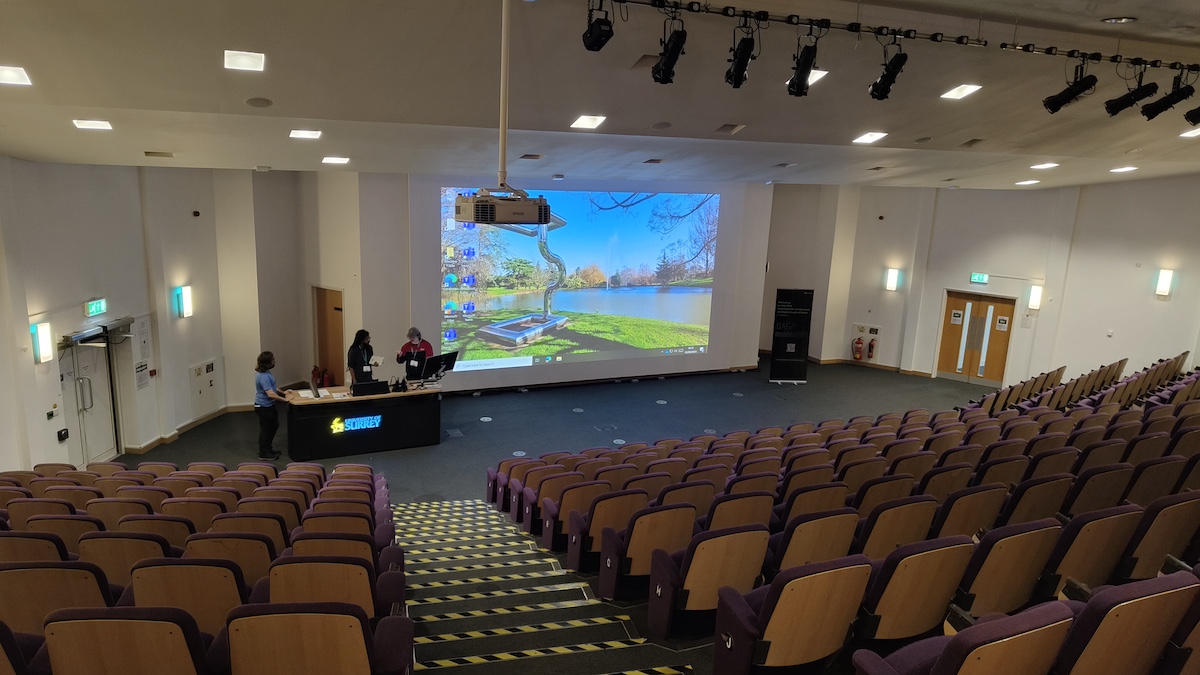 Location of the tutorial in the lecture theatre 03MS01, University of Surrey (September 3, 2024). This is a summary of the guest tutorial that I gave at DAFx24, University of Surrey, UK. This was the brief outlined by Randall Ali, who curated the tutorials: DAFx is a community of people from academia and industry (150 people or so) that meet annually to discuss/present work related to digital audio signal processing for music and speech, design of digital audio effects, sound art, acoustics, and related applications. On the first day of the conference, we invite a few people from academia/industry to give a tutorial for about 2 hours, where particular concepts and/or techniques are taught from the ground up, often in a workshop style, but we leave that up to the speaker to decide how they want to do it. Given that many in the community design audio effects and come up with algorithms to synthesize...
Read more
Location of the tutorial in the lecture theatre 03MS01, University of Surrey (September 3, 2024). This is a summary of the guest tutorial that I gave at DAFx24, University of Surrey, UK. This was the brief outlined by Randall Ali, who curated the tutorials: DAFx is a community of people from academia and industry (150 people or so) that meet annually to discuss/present work related to digital audio signal processing for music and speech, design of digital audio effects, sound art, acoustics, and related applications. On the first day of the conference, we invite a few people from academia/industry to give a tutorial for about 2 hours, where particular concepts and/or techniques are taught from the ground up, often in a workshop style, but we leave that up to the speaker to decide how they want to do it. Given that many in the community design audio effects and come up with algorithms to synthesize...
Read more
-
Reflecting on 2023
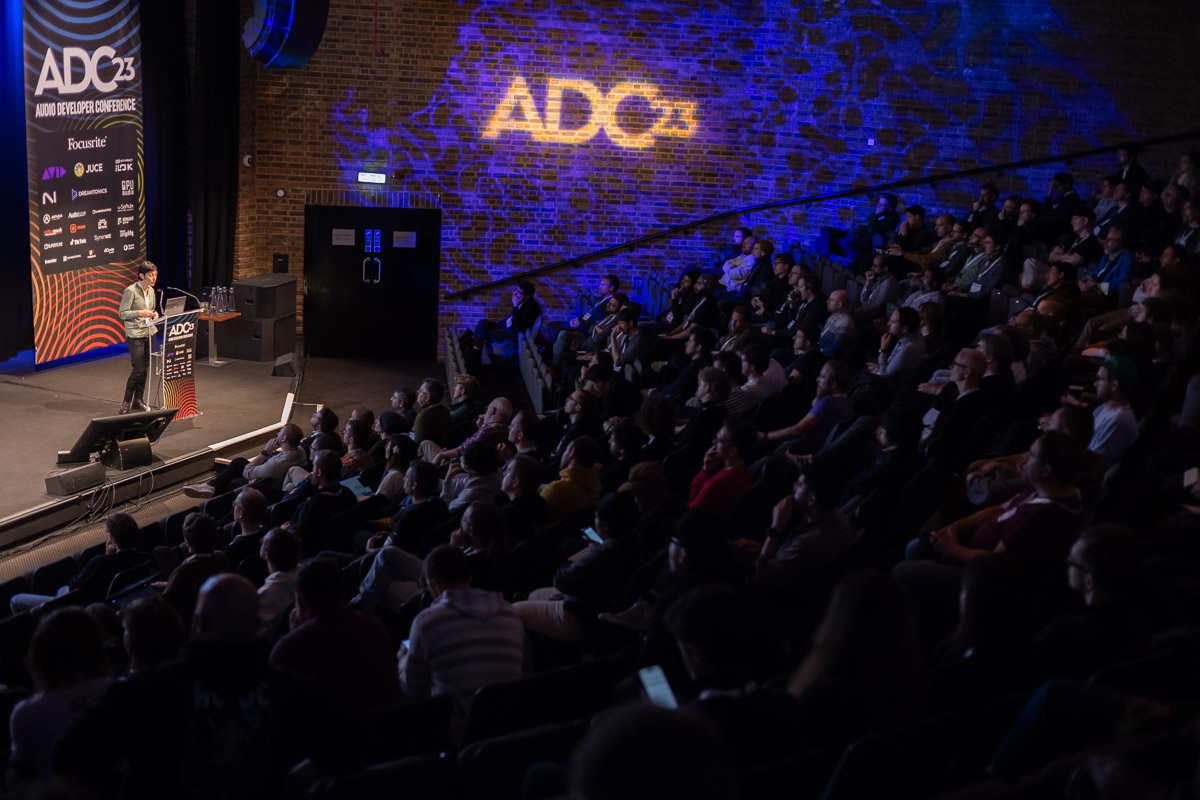 Anna Xambó presenting at ADC23 (November 14, 2023). Photo by the ADC Team. I have been trying to catch up with this blog post since early December 2023. On this occasion, it has not been possible until now. You will find out why at the end of this blog post. Anyhow, in this blog post, I reflect on how this year has been in terms of key activities and outputs, as well as propose my intentions for future achievements. Research Cover of the special issue 'Live Coding Sonic Creativities' for Organised Sound. This year has consolidated two projects that I have been working on for some time: Live Coding Sonic Creativities: This special issue for Organised Sound, co-edited with Gerard Roma, Thor Magnusson and with the help of Leigh Landy, has been published. You can also find an article of mine about the MIRLCAuto project. You can read our editorial as well as my article,...
Read more
Anna Xambó presenting at ADC23 (November 14, 2023). Photo by the ADC Team. I have been trying to catch up with this blog post since early December 2023. On this occasion, it has not been possible until now. You will find out why at the end of this blog post. Anyhow, in this blog post, I reflect on how this year has been in terms of key activities and outputs, as well as propose my intentions for future achievements. Research Cover of the special issue 'Live Coding Sonic Creativities' for Organised Sound. This year has consolidated two projects that I have been working on for some time: Live Coding Sonic Creativities: This special issue for Organised Sound, co-edited with Gerard Roma, Thor Magnusson and with the help of Leigh Landy, has been published. You can also find an article of mine about the MIRLCAuto project. You can read our editorial as well as my article,...
Read more
-
Teaching Audio Electronics using Hybrid Technologies
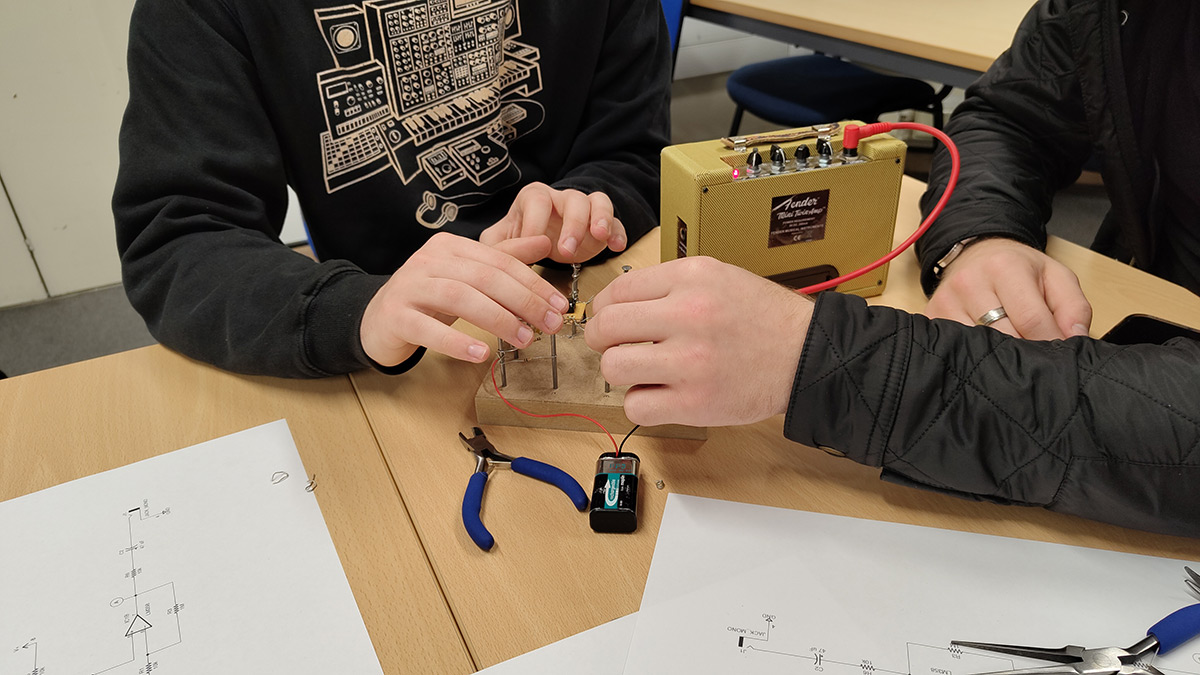 Two students interact with a Bed of Nails circuit. This year, I have taught DIY musical instruments as part of the module MTEC2001 Presentation & Promotion. MTEC2001 is an open module in which the students can select one specialisation to undertake a short intense project. The four specialisations have been: DIY musical instruments, installation art, improvisation ensemble and advanced synthesis and sequencing. This is an L5 (or 2nd) level undergraduate course that is part of the programmes BA Music Technology and BSc Music Production at De Montfort University (DMU). This module is in the context of DMU’s block teaching, which means that, for the electives, the students have 12 sessions of 3 hours each session distributed in 7 weeks. In this blog post, I will share how the electronics projects went and the lessons learned. Previously, I published two other blog posts on teaching audio electronics, Teaching Audio Electronics during COVID: Inventiveness and Opportunities (May...
Read more
Two students interact with a Bed of Nails circuit. This year, I have taught DIY musical instruments as part of the module MTEC2001 Presentation & Promotion. MTEC2001 is an open module in which the students can select one specialisation to undertake a short intense project. The four specialisations have been: DIY musical instruments, installation art, improvisation ensemble and advanced synthesis and sequencing. This is an L5 (or 2nd) level undergraduate course that is part of the programmes BA Music Technology and BSc Music Production at De Montfort University (DMU). This module is in the context of DMU’s block teaching, which means that, for the electives, the students have 12 sessions of 3 hours each session distributed in 7 weeks. In this blog post, I will share how the electronics projects went and the lessons learned. Previously, I published two other blog posts on teaching audio electronics, Teaching Audio Electronics during COVID: Inventiveness and Opportunities (May...
Read more
-
We Are Hiring! Postdoc in Sound and Music Computing
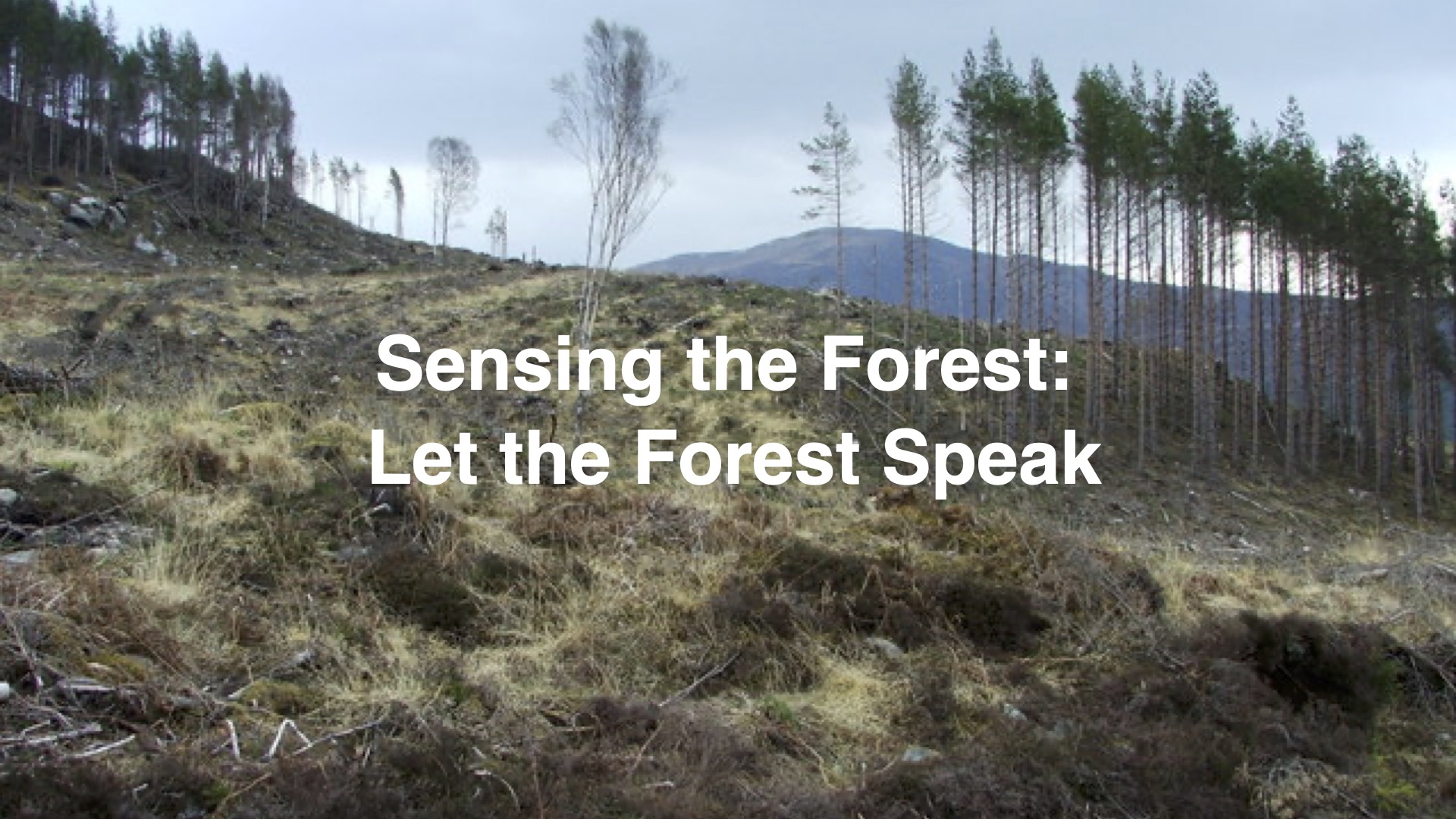 Sensing the forest. Let the forest speak. We are hiring! A part-time (50% FTE), 23-month Postdoctoral Research Fellow position is available to work at the forefront of Sound and Music Computing as part of the AHRC-funded project “Sensing the Forest - Let the Forest Speak using the Internet of Things, Acoustic Ecology and Creative AI” at De Montfort University (DMU) in Leicester, UK. The project is led by Anna Xambó Sedó (PI, DMU), Peter Batchelor (Co-I, DMU), Matthew Wilkinson (Co-I, Forest Research), and Georgios Xenakis (Co-I, Forest Research). The proposed project aims to raise awareness among forest visitors/aficionados, artists, scientists, and the general public about the connection between forests and climate change. Community building will centre on looking at a better understanding of forest behaviour using complex scientific data in creative and artistic ways. Application link: https://dmuhub.dmu.ac.uk Application deadline: 13 August 2023 Interviews: 24-25 August 2023 Job start: 1 October 2023 For informal enquiries about...
Read more
Sensing the forest. Let the forest speak. We are hiring! A part-time (50% FTE), 23-month Postdoctoral Research Fellow position is available to work at the forefront of Sound and Music Computing as part of the AHRC-funded project “Sensing the Forest - Let the Forest Speak using the Internet of Things, Acoustic Ecology and Creative AI” at De Montfort University (DMU) in Leicester, UK. The project is led by Anna Xambó Sedó (PI, DMU), Peter Batchelor (Co-I, DMU), Matthew Wilkinson (Co-I, Forest Research), and Georgios Xenakis (Co-I, Forest Research). The proposed project aims to raise awareness among forest visitors/aficionados, artists, scientists, and the general public about the connection between forests and climate change. Community building will centre on looking at a better understanding of forest behaviour using complex scientific data in creative and artistic ways. Application link: https://dmuhub.dmu.ac.uk Application deadline: 13 August 2023 Interviews: 24-25 August 2023 Job start: 1 October 2023 For informal enquiries about...
Read more
-
Awarded an AHRC Early Career Grant
 Sensing the forest. Let the forest speak. Peter Batchelor (DMU, LMS/MTI^2), Matthew Wilkinson (Forest Research), Georgios Xenakis (Forest Research) and I as a Principal Investigator (DMU, LMS/MTI^2) have been awarded an AHRC Early Career Grant for our project “Sensing the Forest: Let the Forest Speak using the Internet of Things, Acoustic Ecology and Creative AI”. This project brings the MTI^2 expertise in acoustic ecology and sonic arts to help combat climate change in the forest. As part of the project, we will be collaborating with the project partner Forestry England, Krishna Nama Manjunatha (DMU, ESD/IES), and Ashok Karatrava (DMU, CEM), among others. This project was developed during my participation at the Vice-Chancellor’s Future Research Leaders Programme (FRL8 2021-2022), with special thanks to Mike Baynham (programme leader), Deborah Cartmell, Emma Vadher, Raffaella Villa, James Russell, Shushma Patel and the Future Research Leaders 8 Cohort. The proposal was finalised during my sabbatical in October-November 2022 with special...
Read more
Sensing the forest. Let the forest speak. Peter Batchelor (DMU, LMS/MTI^2), Matthew Wilkinson (Forest Research), Georgios Xenakis (Forest Research) and I as a Principal Investigator (DMU, LMS/MTI^2) have been awarded an AHRC Early Career Grant for our project “Sensing the Forest: Let the Forest Speak using the Internet of Things, Acoustic Ecology and Creative AI”. This project brings the MTI^2 expertise in acoustic ecology and sonic arts to help combat climate change in the forest. As part of the project, we will be collaborating with the project partner Forestry England, Krishna Nama Manjunatha (DMU, ESD/IES), and Ashok Karatrava (DMU, CEM), among others. This project was developed during my participation at the Vice-Chancellor’s Future Research Leaders Programme (FRL8 2021-2022), with special thanks to Mike Baynham (programme leader), Deborah Cartmell, Emma Vadher, Raffaella Villa, James Russell, Shushma Patel and the Future Research Leaders 8 Cohort. The proposal was finalised during my sabbatical in October-November 2022 with special...
Read more
-
100 Blog Posts
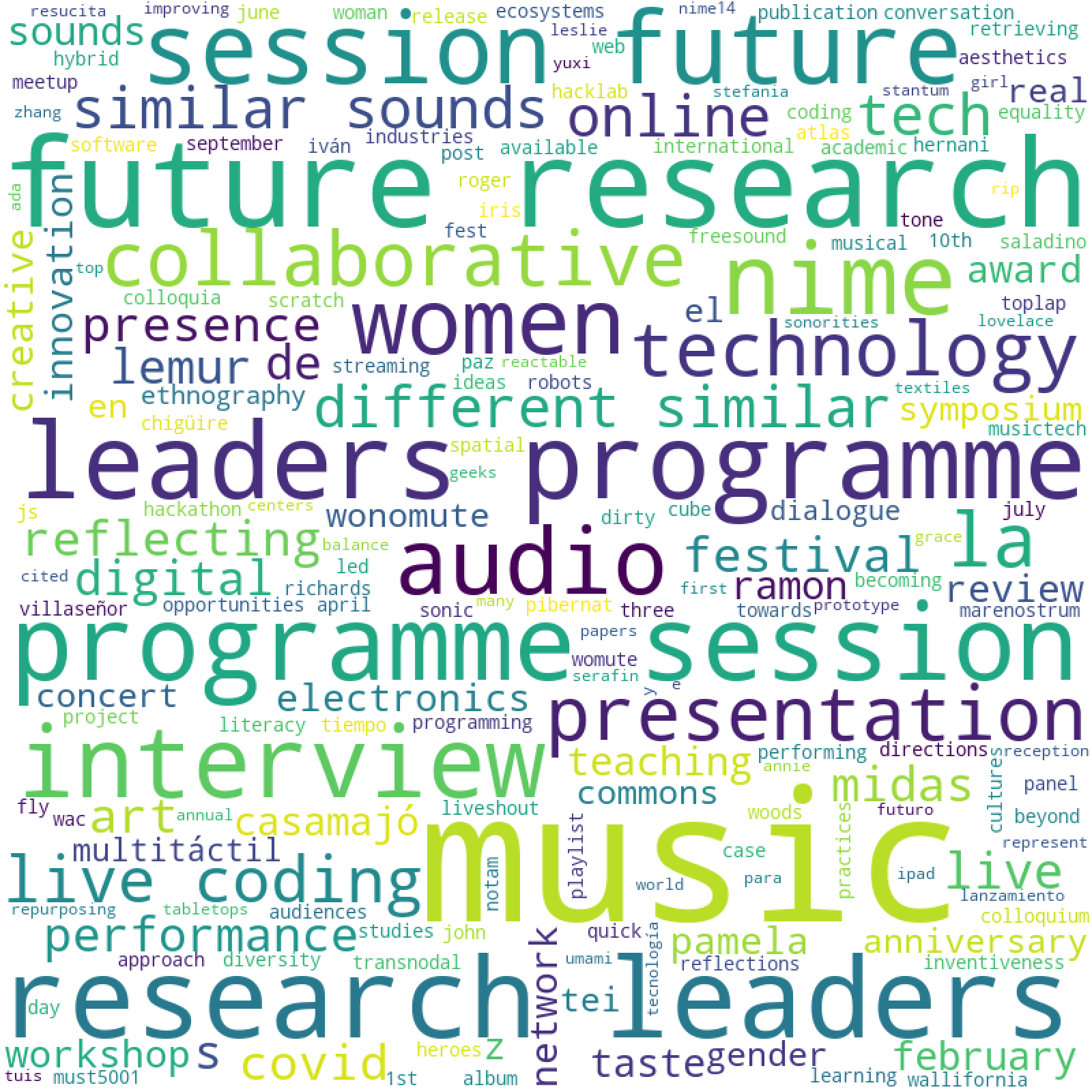 Figure 1. Wordcloud of 100 blog posts' titles. I have been blogging for some time and have reached a hundred blog posts. I thought that it would be nice to celebrate this milestone by revisiting the 100 blog posts in numbers, listed here. Figure 1 illustrates a wordcloud generated from the titles of the hundred blog posts. Prominent words include music, research, women, and technology. By Year I wrote my first blog post in 2006 for my first blog named streeTypes, and I wrote here my 100th blog post in 2022. This is 16 years of blogging! Figure 2 shows a count plot of the total amount of blog posts by year, with an increasing trend. The year 2021 was especially fruitful writing a total of 16 blog posts. In the second position, there is 2022 with a total of 14 blog posts. A monthly blog post is my target for the upcoming months. Figure...
Read more
Figure 1. Wordcloud of 100 blog posts' titles. I have been blogging for some time and have reached a hundred blog posts. I thought that it would be nice to celebrate this milestone by revisiting the 100 blog posts in numbers, listed here. Figure 1 illustrates a wordcloud generated from the titles of the hundred blog posts. Prominent words include music, research, women, and technology. By Year I wrote my first blog post in 2006 for my first blog named streeTypes, and I wrote here my 100th blog post in 2022. This is 16 years of blogging! Figure 2 shows a count plot of the total amount of blog posts by year, with an increasing trend. The year 2021 was especially fruitful writing a total of 16 blog posts. In the second position, there is 2022 with a total of 14 blog posts. A monthly blog post is my target for the upcoming months. Figure...
Read more
-
Reflecting on 2022
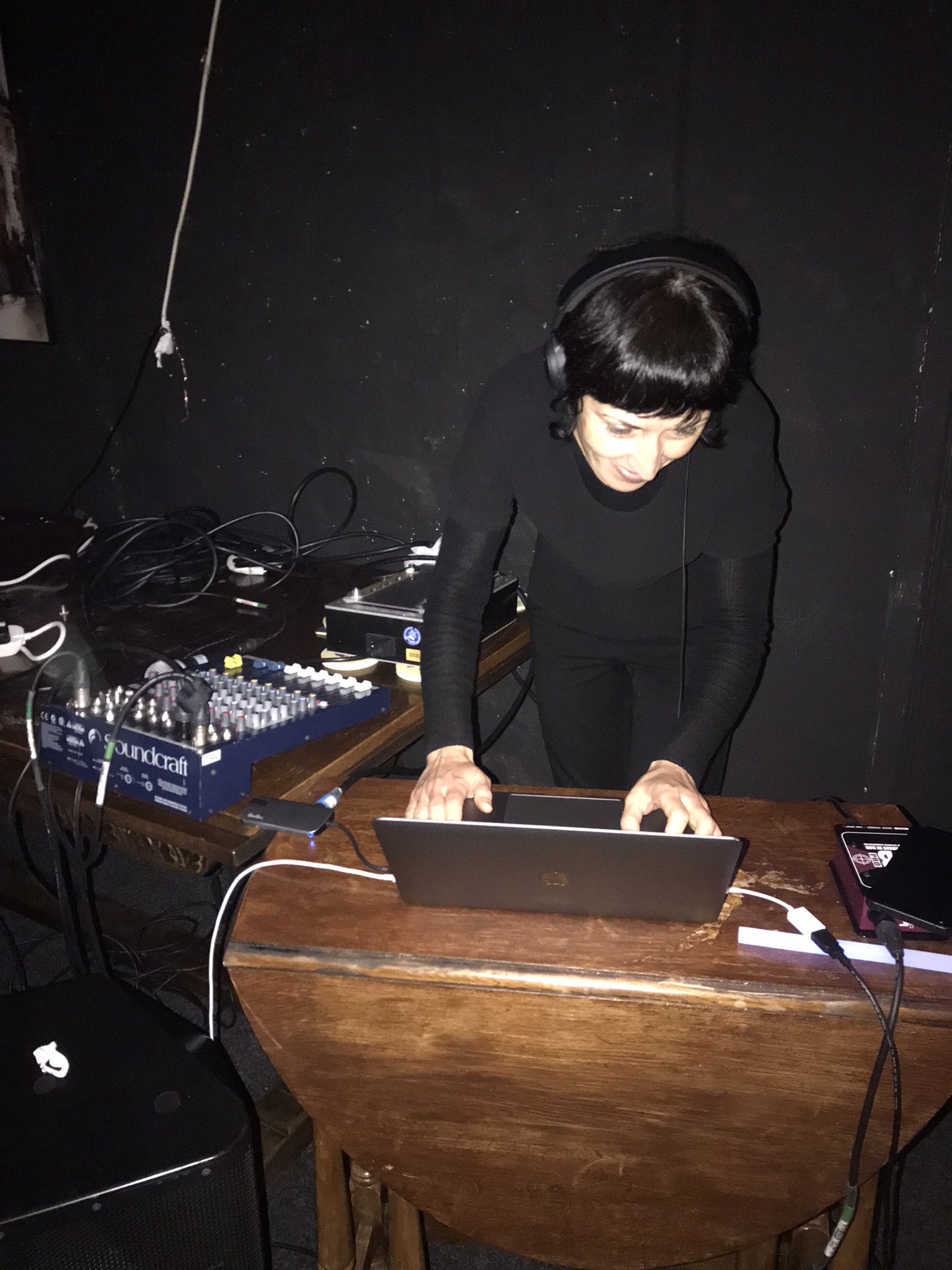 Anna Xambó preparing for her performance at the British Science Festival (September 16, 2022). Photo by Chris Johnston. This year has been the awakening after a +2-year global pandemic which started in early 2020 in the UK. Still, other global crises have arisen, such as the war in Ukraine, the energetic crisis, and the cost of living crisis, together with already existing global crises such as climate change. In addition to that, this has been a dark summer for MTI2, my research centre at De Montfort University, where all the staff has been threatened with redundancy posts. On the way, we have lost two incredible colleagues, John Richards and Kevin Dahan. Under these circumstances, it is difficult to keep doing research and making music steadily, but at the same time, it is the part of my job that I enjoy the most. On the bright side, I have been lucky to be part of the...
Read more
Anna Xambó preparing for her performance at the British Science Festival (September 16, 2022). Photo by Chris Johnston. This year has been the awakening after a +2-year global pandemic which started in early 2020 in the UK. Still, other global crises have arisen, such as the war in Ukraine, the energetic crisis, and the cost of living crisis, together with already existing global crises such as climate change. In addition to that, this has been a dark summer for MTI2, my research centre at De Montfort University, where all the staff has been threatened with redundancy posts. On the way, we have lost two incredible colleagues, John Richards and Kevin Dahan. Under these circumstances, it is difficult to keep doing research and making music steadily, but at the same time, it is the part of my job that I enjoy the most. On the bright side, I have been lucky to be part of the...
Read more
-
Walk to Think
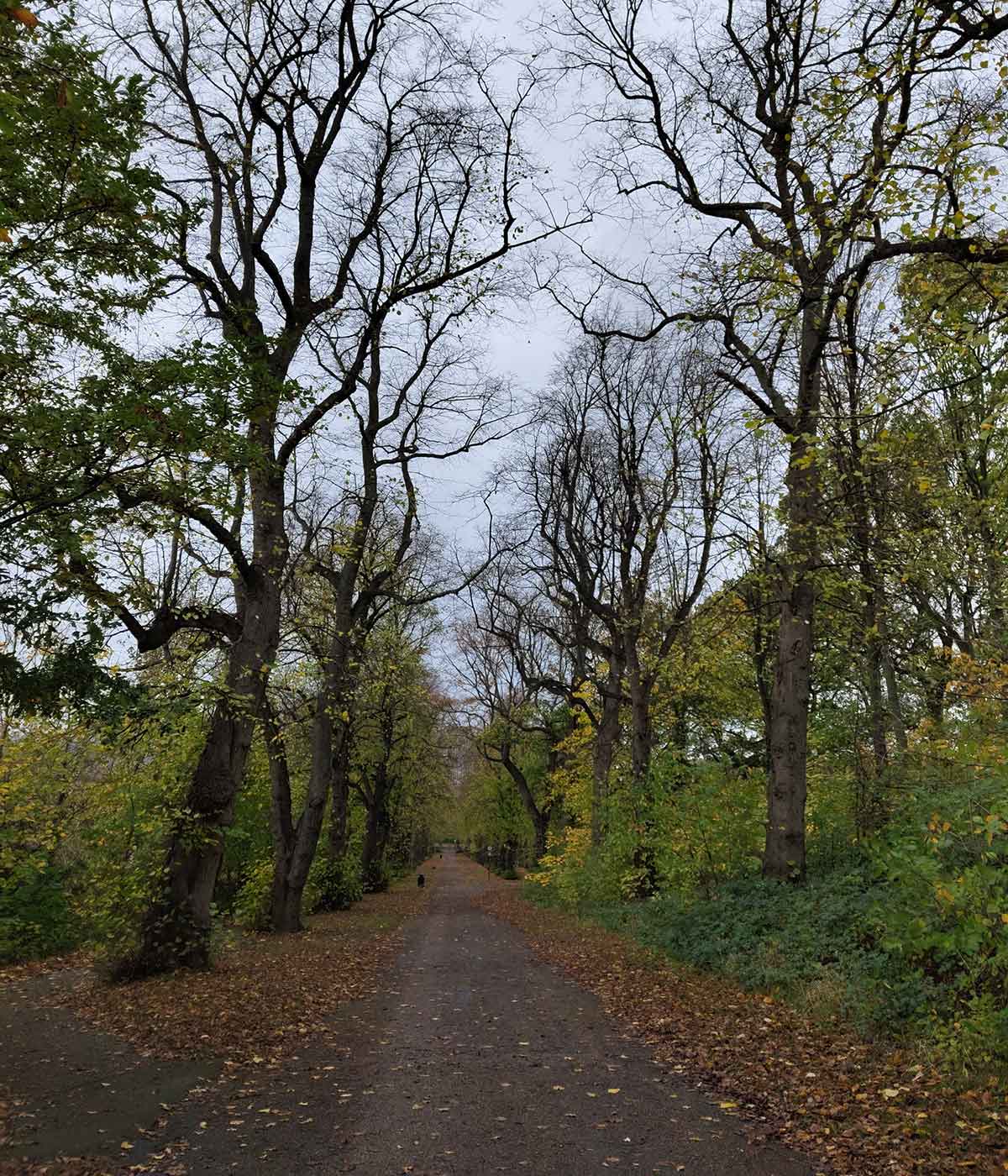 Walking in the Norfolk Heritage Park in Sheffield. Walk to think Walk to expand Walk to imagine Walk to ideate Walk to make it possible Walk to dream Walk to breathe Walk to free Walk to travel Walk to experience Walk to map Walk to touch Walk to see Walk to listen Walk to smell Walk to taste Walk to explore Walk to discover Walk to embrace Walk to rethink Walk to pause Walk to play Walk to inspect Walk to move Walk to progress Walk to stimulate Walk to connect Walk to learn Walk to pace Walk to structure Walk to restructure Walk to destroy Walk to create Walk to meet Walk to be alone Walk to be with people Walk to socialise Walk to settle Walk to unsettle Walk to exercise Walk to question Walk to be The walk has been a common literary metaphor, notably used by Antonio Machado in “Caminante, no...
Read more
Walking in the Norfolk Heritage Park in Sheffield. Walk to think Walk to expand Walk to imagine Walk to ideate Walk to make it possible Walk to dream Walk to breathe Walk to free Walk to travel Walk to experience Walk to map Walk to touch Walk to see Walk to listen Walk to smell Walk to taste Walk to explore Walk to discover Walk to embrace Walk to rethink Walk to pause Walk to play Walk to inspect Walk to move Walk to progress Walk to stimulate Walk to connect Walk to learn Walk to pace Walk to structure Walk to restructure Walk to destroy Walk to create Walk to meet Walk to be alone Walk to be with people Walk to socialise Walk to settle Walk to unsettle Walk to exercise Walk to question Walk to be The walk has been a common literary metaphor, notably used by Antonio Machado in “Caminante, no...
Read more
-
Research Concert at the British Science Festival 2022
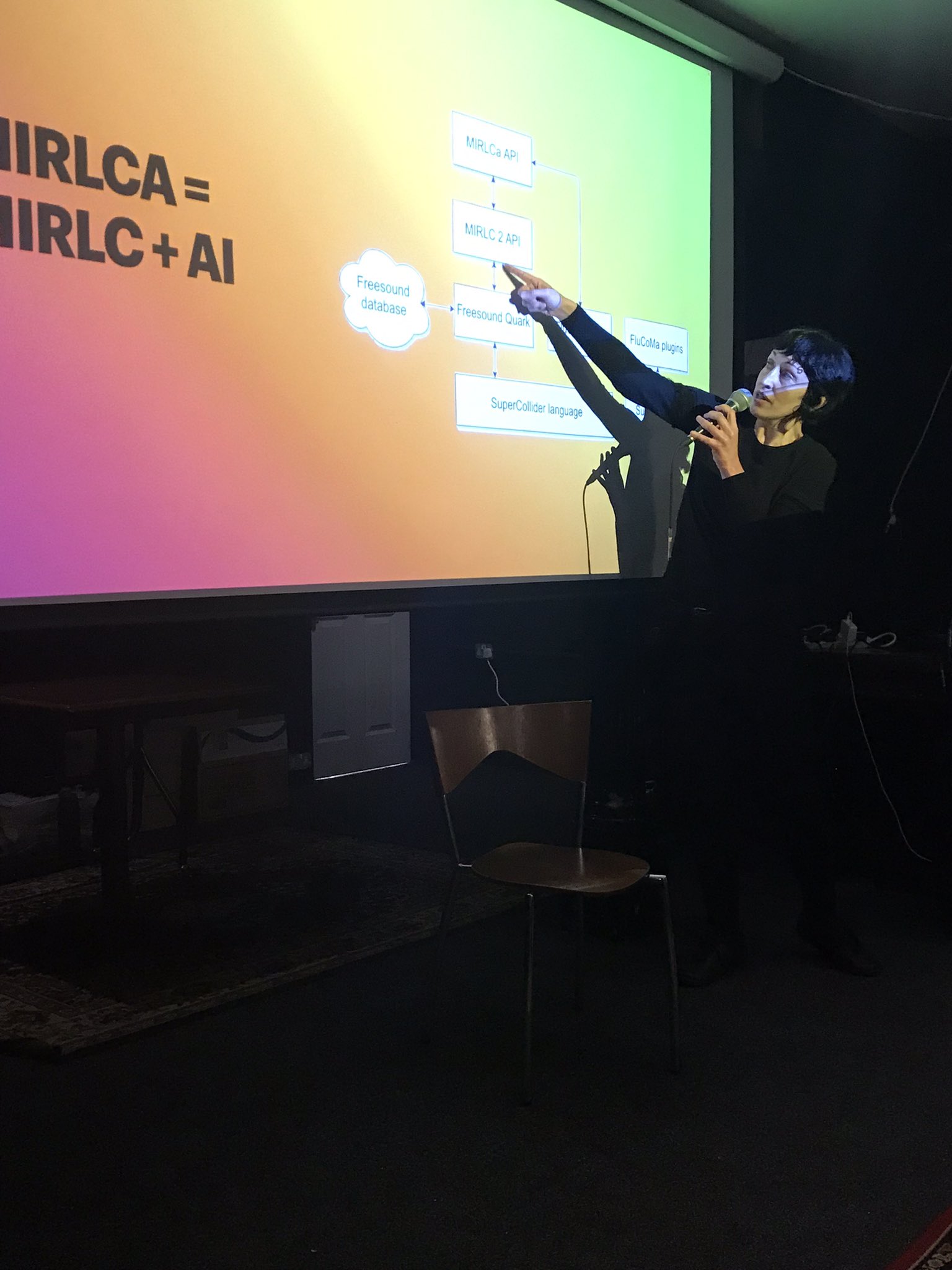 Anna Xambó presenting MIRLCa at the British Science Festival (September 16, 2022). Photo by Chris Johnston. The first time I heard about the concept of a ‘research concert’ was when I was at the Norwegian University of Science and Technology (NTNU) in Trondheim, Norway in 2018. In Norwegian, it is referred to as a “forskningskonsert”. A research concert is a session where the performer(s) includes explanations about the technicalities and research involved in the musical instruments used in the performance. It is an open dialogue with the audience about what is behind the scenes. Øyvind Brandtsegg and Tone Åse invited me to give a forskningskonsert at the fantastic venue Dokkhuset on November 24, 2018. It was a Saturday and the performance was at 14.00. This already was giving a cue that the type of concert was different. The title of the session was “A session on participatory mobile music and live coding using crowdsourced sounds”....
Read more
Anna Xambó presenting MIRLCa at the British Science Festival (September 16, 2022). Photo by Chris Johnston. The first time I heard about the concept of a ‘research concert’ was when I was at the Norwegian University of Science and Technology (NTNU) in Trondheim, Norway in 2018. In Norwegian, it is referred to as a “forskningskonsert”. A research concert is a session where the performer(s) includes explanations about the technicalities and research involved in the musical instruments used in the performance. It is an open dialogue with the audience about what is behind the scenes. Øyvind Brandtsegg and Tone Åse invited me to give a forskningskonsert at the fantastic venue Dokkhuset on November 24, 2018. It was a Saturday and the performance was at 14.00. This already was giving a cue that the type of concert was different. The title of the session was “A session on participatory mobile music and live coding using crowdsourced sounds”....
Read more
-
Pauca Sed Matura - Slow Research vs Publish or Perish
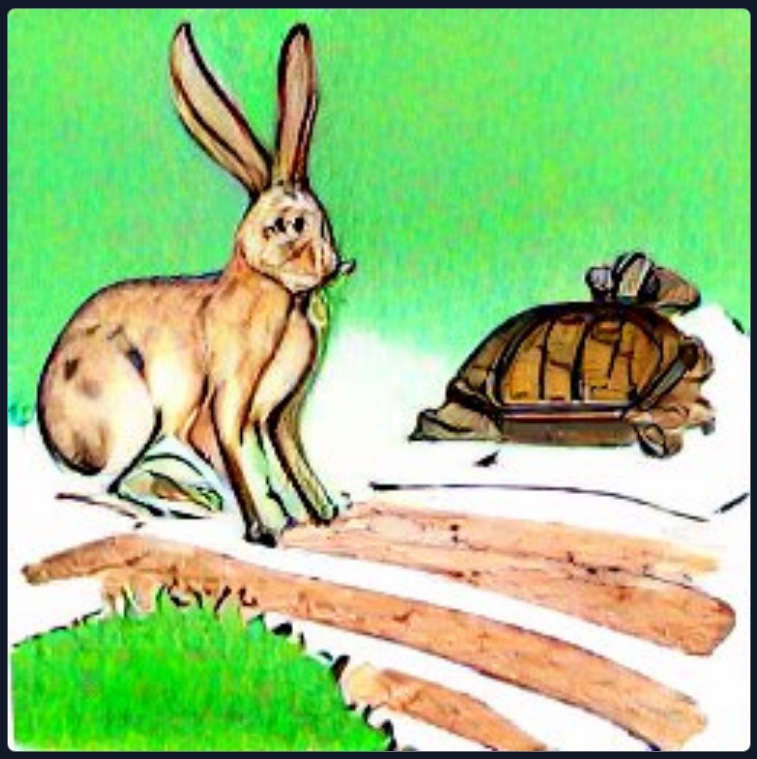 The hare and the tortoise. Image generated with Craiyon. The first time I heard about slow research was from Sølvi Ystad. We met in February 2020, when she accepted our invitation to give a seminar talk and interview for the Women Nordic Music Technology (WoNoMute) seminar series in Trondheim, Norway in collaboration with the Norwegian University of Science and Technology and the University of Oslo. Sølvi holds a research position at Le Centre national de la recherche scientifique (the French National Centre for Scientific Research), one of the most prestigious and leading research institutions in the world. Slow research, slow science, and slow scholarship are inspired by the slow movement of adjusting life to a slower pace so that we can prioritise quality over quantity. In 2010, a group of scientists published “The Slow Science Manifesto”: Science needs time to think. Science needs time to read, and time to fail. Science does not always know...
Read more
The hare and the tortoise. Image generated with Craiyon. The first time I heard about slow research was from Sølvi Ystad. We met in February 2020, when she accepted our invitation to give a seminar talk and interview for the Women Nordic Music Technology (WoNoMute) seminar series in Trondheim, Norway in collaboration with the Norwegian University of Science and Technology and the University of Oslo. Sølvi holds a research position at Le Centre national de la recherche scientifique (the French National Centre for Scientific Research), one of the most prestigious and leading research institutions in the world. Slow research, slow science, and slow scholarship are inspired by the slow movement of adjusting life to a slower pace so that we can prioritise quality over quantity. In 2010, a group of scientists published “The Slow Science Manifesto”: Science needs time to think. Science needs time to read, and time to fail. Science does not always know...
Read more
-
Presence at NIME 2022
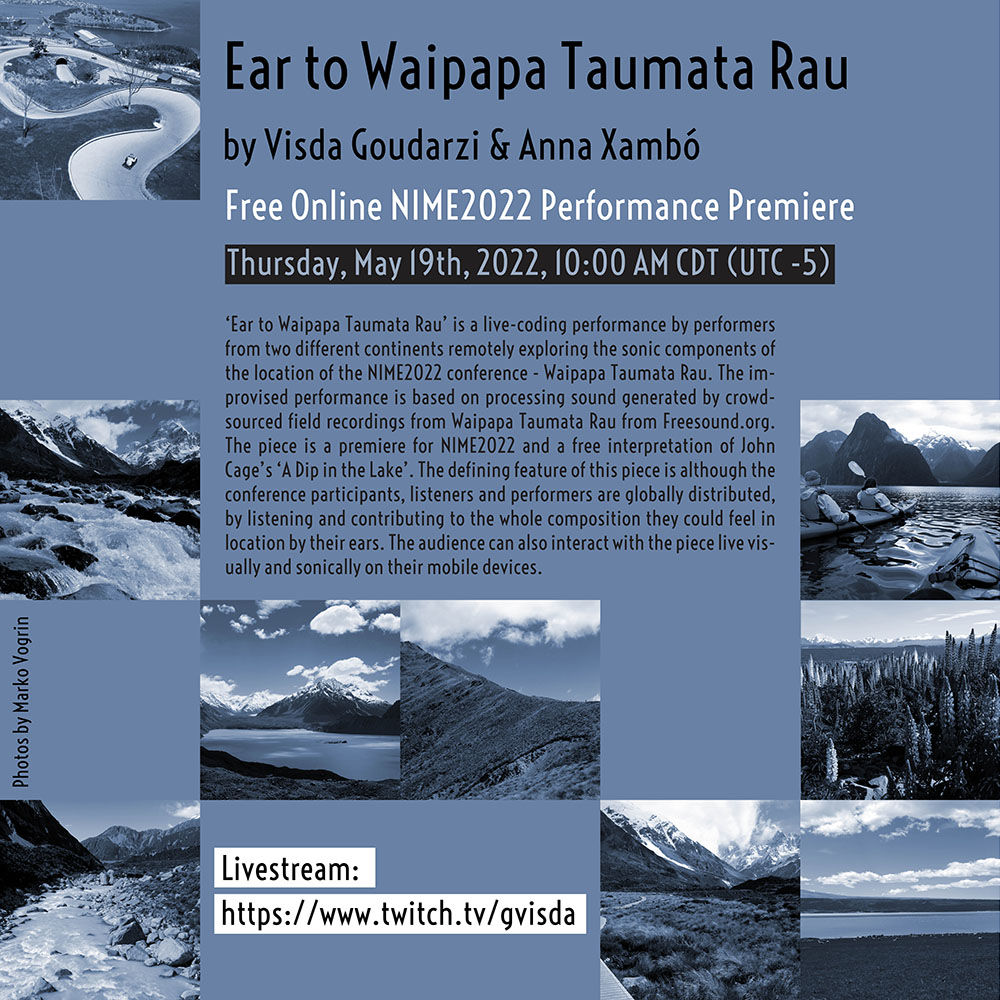 Flyer of our performance Ear to Waipapa Taumata Rau This year Visda Goudarzi and I presented a paper and a performance at the annual international conference New Interfaces for Musical Expression 2022, which has been virtually held at Waipapa Taumata Rau, Aotearoa / The University of Auckland, New Zealand. The Mobile Audience as a Digital Musical Persona in Telematic Performance Short Paper: Xambó, A., Goudarzi, V. (2022) “The Mobile Audience as a Digital Musical Persona in Telematic Performance” [PDF] [PubPub]. In Proceedings of the New Interfaces for Musical Expression (NIME ’22). Waipapa Taumata Rau, Aotearoa / The University of Auckland, New Zealand. [Video] Ear to Waipapa Taumata Rau Performance: Goudarzi, V., Xambó, A. (2022) “Ear to Waipapa Taumata Rau”. In Proceedings of the New Interfaces for Musical Expression (NIME ’22). Waipapa Taumata Rau, Aotearoa / The University of Auckland, New Zealand. [Video] Acknowledgements Thank you very much to the NIME 2022 committee for organising a...
Read more
Flyer of our performance Ear to Waipapa Taumata Rau This year Visda Goudarzi and I presented a paper and a performance at the annual international conference New Interfaces for Musical Expression 2022, which has been virtually held at Waipapa Taumata Rau, Aotearoa / The University of Auckland, New Zealand. The Mobile Audience as a Digital Musical Persona in Telematic Performance Short Paper: Xambó, A., Goudarzi, V. (2022) “The Mobile Audience as a Digital Musical Persona in Telematic Performance” [PDF] [PubPub]. In Proceedings of the New Interfaces for Musical Expression (NIME ’22). Waipapa Taumata Rau, Aotearoa / The University of Auckland, New Zealand. [Video] Ear to Waipapa Taumata Rau Performance: Goudarzi, V., Xambó, A. (2022) “Ear to Waipapa Taumata Rau”. In Proceedings of the New Interfaces for Musical Expression (NIME ’22). Waipapa Taumata Rau, Aotearoa / The University of Auckland, New Zealand. [Video] Acknowledgements Thank you very much to the NIME 2022 committee for organising a...
Read more
-
Rapid Prototyping With Online Pilot Testing
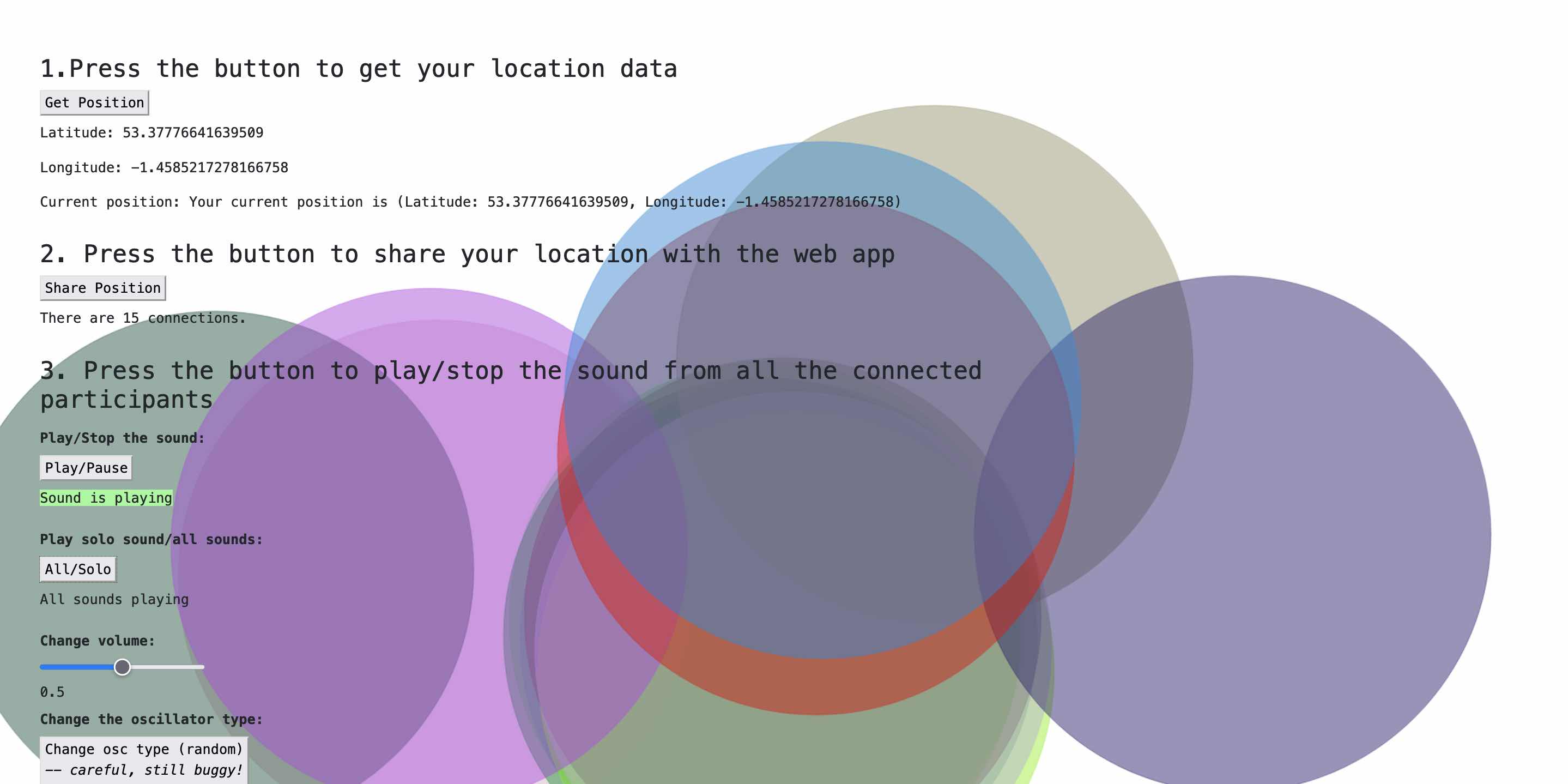 Screenshot of the web app personic during the third pilot study. In June 2022, Visda Goudarzi (Co-I), Abbey Young (research assistant) and I (PI) have been running three online pilot studies allowing participants to (1) try a new mobile web app for telematic performance; (2) participate musically in performance (and not only via the typical online chat); and (3) shape the future of how mobile web apps for audience engagement should look like. In this blog post, I would like to reflect on the experience of running online pilot studies in combination with rapid prototyping techniques to incorporate the feedback obtained from the participants in the next iteration of the prototype. The conditions to participate in one of the three pilot studies were that anyone from anywhere in the world could participate as long as they had access to an internet connection, and a mobile phone or a laptop/desktop computer. The participants were asked to...
Read more
Screenshot of the web app personic during the third pilot study. In June 2022, Visda Goudarzi (Co-I), Abbey Young (research assistant) and I (PI) have been running three online pilot studies allowing participants to (1) try a new mobile web app for telematic performance; (2) participate musically in performance (and not only via the typical online chat); and (3) shape the future of how mobile web apps for audience engagement should look like. In this blog post, I would like to reflect on the experience of running online pilot studies in combination with rapid prototyping techniques to incorporate the feedback obtained from the participants in the next iteration of the prototype. The conditions to participate in one of the three pilot studies were that anyone from anywhere in the world could participate as long as they had access to an internet connection, and a mobile phone or a laptop/desktop computer. The participants were asked to...
Read more
-
Teaching Audio Electronics Post-COVID - A Hybrid Project-Led Approach
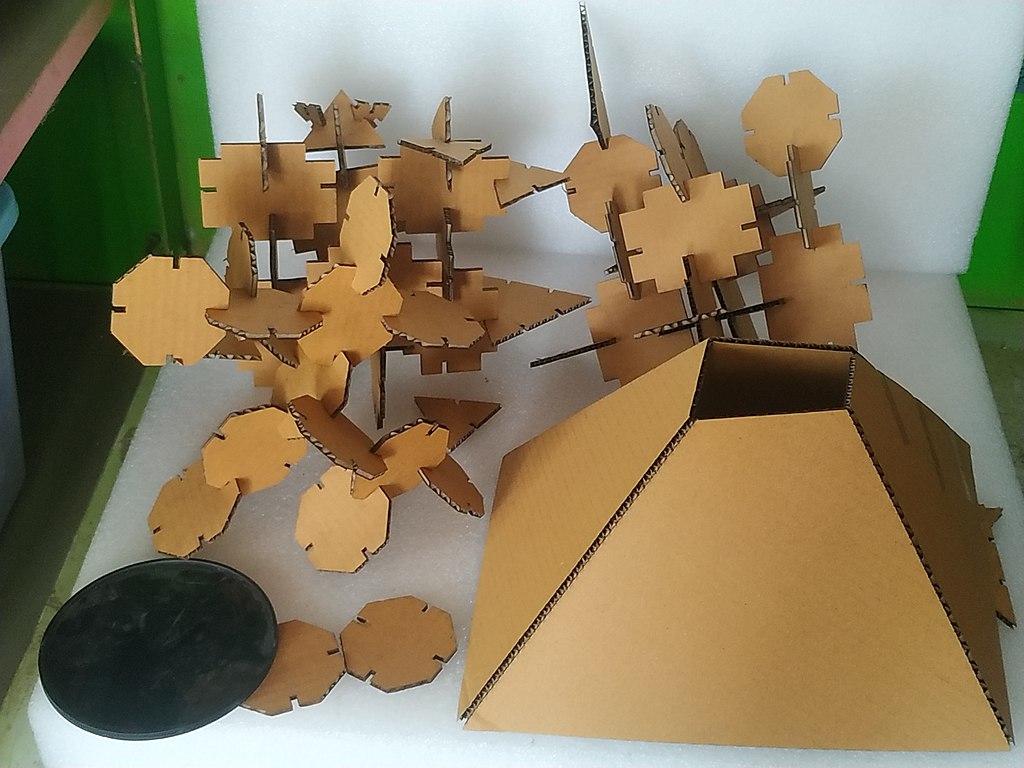 Objects created by laser cutter machine. Author: Thitediksha. License: CC BY-SA 4.0 (https://creativecommons.org/licenses/by-sa/4.0/deed.en). Image source: https://commons.wikimedia.org This spring 2022 I’ve been giving the lectures and labs of the new module MATD3039 Advanced Musical Electronics, a 3rd-year module that builds on the 2nd-year module MATD2029 Sensors and interfaces led by John Richards, and the 1st-year module MATD1019 Audio Electronics Fundamentals, of which I was in charge of the lectures. In this module, we would cover the Arduino software, Arduino hardware, sensors and actuators, an introduction to the Mozzi library, building a digital oscillator, and an introduction to Fritzing, among others. When designing the module, I carefully considered that I wanted to bring the ‘good’ parts of the pandemic, to be combined with the ‘good’ parts of teaching on-site, especially audio electronics. The ‘good’ parts of teaching during the pandemic have been to use the collaborative tools available on Teams, such as the whiteboard or the chat,...
Read more
Objects created by laser cutter machine. Author: Thitediksha. License: CC BY-SA 4.0 (https://creativecommons.org/licenses/by-sa/4.0/deed.en). Image source: https://commons.wikimedia.org This spring 2022 I’ve been giving the lectures and labs of the new module MATD3039 Advanced Musical Electronics, a 3rd-year module that builds on the 2nd-year module MATD2029 Sensors and interfaces led by John Richards, and the 1st-year module MATD1019 Audio Electronics Fundamentals, of which I was in charge of the lectures. In this module, we would cover the Arduino software, Arduino hardware, sensors and actuators, an introduction to the Mozzi library, building a digital oscillator, and an introduction to Fritzing, among others. When designing the module, I carefully considered that I wanted to bring the ‘good’ parts of the pandemic, to be combined with the ‘good’ parts of teaching on-site, especially audio electronics. The ‘good’ parts of teaching during the pandemic have been to use the collaborative tools available on Teams, such as the whiteboard or the chat,...
Read more
-
Future Research Leaders Programme Session 8
.jpg) Luna Park. Author: Eva Rinaldi. License: CC BY-SA 2.0 (https://creativecommons.org/licenses/by-sa/2.0/). Image source: https://commons.wikimedia.org Future Research Leaders 2021/22 Showcase … and the day arrived! Since I started at DMU in 2020, I’ve been attending the Future Research Leaders presentations (typically scheduled in September) and have always been interested in this programme. For this session, we were tasked to present for 10 minutes covering the following topics: An introduction to yourself and your research; What you learnt during the FRL year and what you achieved; What do you hope to contribute to DMU through your research leadership. The key point has been to communicate what we have done and learned on the FRL Programme and present it to the wider DMU community. It has been great to see the progress of all my peers, and all we have accomplished. Take-away messages have been to don’t give up, to learn from failures, to be resilient, and to think...
Read more
Luna Park. Author: Eva Rinaldi. License: CC BY-SA 2.0 (https://creativecommons.org/licenses/by-sa/2.0/). Image source: https://commons.wikimedia.org Future Research Leaders 2021/22 Showcase … and the day arrived! Since I started at DMU in 2020, I’ve been attending the Future Research Leaders presentations (typically scheduled in September) and have always been interested in this programme. For this session, we were tasked to present for 10 minutes covering the following topics: An introduction to yourself and your research; What you learnt during the FRL year and what you achieved; What do you hope to contribute to DMU through your research leadership. The key point has been to communicate what we have done and learned on the FRL Programme and present it to the wider DMU community. It has been great to see the progress of all my peers, and all we have accomplished. Take-away messages have been to don’t give up, to learn from failures, to be resilient, and to think...
Read more
-
Future Research Leaders Programme Session 7
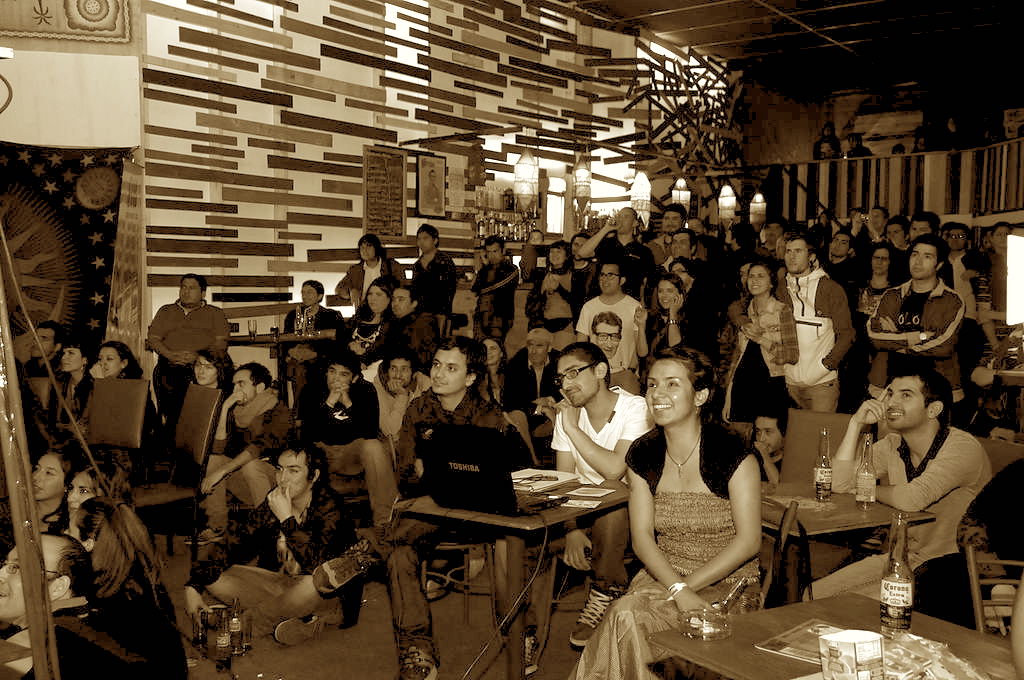 Pechakucha in Concepción, Chile. Author: Alejandraardilla. License: CC BY-SA 3.0 (https://creativecommons.org/licenses/by-sa/3.0/deed.en). Image source: https://commons.wikimedia.org Dragon’s Den Session In this session, we had the following brief: “to pitch an idea for a research network or research collaboration involving external partners. This can be aligned with DMU strategic directions and should be a development of your current activities.” We were given 4 minutes only, and had to cover the following areas: The theme and title of your network or research collaboration; How it both draws on and extends your current research profile; Who you can draw on from within DMU to participate; What external partners do you envisage and how you would get them involved; What kind of outputs do you envisage: seminars, conferences, publications, funding applications; What external funding sources you would target. We had a panel including: Associate PVC Research Professor Deborah Cartmell Peter Cross Chief Finance Officer Vice-Chancellor Katie Normington (attended part of the...
Read more
Pechakucha in Concepción, Chile. Author: Alejandraardilla. License: CC BY-SA 3.0 (https://creativecommons.org/licenses/by-sa/3.0/deed.en). Image source: https://commons.wikimedia.org Dragon’s Den Session In this session, we had the following brief: “to pitch an idea for a research network or research collaboration involving external partners. This can be aligned with DMU strategic directions and should be a development of your current activities.” We were given 4 minutes only, and had to cover the following areas: The theme and title of your network or research collaboration; How it both draws on and extends your current research profile; Who you can draw on from within DMU to participate; What external partners do you envisage and how you would get them involved; What kind of outputs do you envisage: seminars, conferences, publications, funding applications; What external funding sources you would target. We had a panel including: Associate PVC Research Professor Deborah Cartmell Peter Cross Chief Finance Officer Vice-Chancellor Katie Normington (attended part of the...
Read more
-
Future Research Leaders Programme Session 6
.jpg) Portrait of a woman seated in a boat with a fishing rod. Author: Collins, Tudor Washington, 1898-1970, photographer. License: CC BY 4.0 (https://creativecommons.org/licenses/by/4.0/deed.en). Image source: https://commons.wikimedia.org Grant Capture Strategy This sixth session has taken place on April 6, 2022. The main topic of discussion has been grant capture strategy. We have discussed our plans for developing our research grant application strategy within the next 3-5 years. Prior to the session, we were tasked to work in pairs by exchanging a research proposal that we are working on at the moment or a recent proposal that was not successful with plans to resubmit it and give/receive feedback. In the session, we agreed that we found this task very useful because you get the opinion from somebody with fresh eyes who sees it from another disciplinary angle which can be very informative. We have begun the session by reflecting on and drawing out lessons from our research...
Read more
Portrait of a woman seated in a boat with a fishing rod. Author: Collins, Tudor Washington, 1898-1970, photographer. License: CC BY 4.0 (https://creativecommons.org/licenses/by/4.0/deed.en). Image source: https://commons.wikimedia.org Grant Capture Strategy This sixth session has taken place on April 6, 2022. The main topic of discussion has been grant capture strategy. We have discussed our plans for developing our research grant application strategy within the next 3-5 years. Prior to the session, we were tasked to work in pairs by exchanging a research proposal that we are working on at the moment or a recent proposal that was not successful with plans to resubmit it and give/receive feedback. In the session, we agreed that we found this task very useful because you get the opinion from somebody with fresh eyes who sees it from another disciplinary angle which can be very informative. We have begun the session by reflecting on and drawing out lessons from our research...
Read more
-
Future Research Leaders Programme Session 5
 Traditional yin and yang with dots (adapted). Author: Klem. License: Public domain. Image source: https://commons.wikimedia.org Research Leadership This fifth session did take place on March 9, 2022. The main topic of discussion was research leadership. We were tasked to interview a research leader in our field and bring back the lessons learned of what we think is the nature of research leadership. We approached the task of creating the set of interview questions collaboratively, based on Mike Baynham’s brief. This helped the group to be more confident with the 1-1 interviews. This resulted in strong presentations during the session. This session started with a warm-up activity of sharing with a neighbour our experiences of good and bad academic leadership. We then moved to 5-minute presentations in the plenary group about our respective interviews to identify whether there is a one style fits all approach to research leadership and start thinking about what kind of research...
Read more
Traditional yin and yang with dots (adapted). Author: Klem. License: Public domain. Image source: https://commons.wikimedia.org Research Leadership This fifth session did take place on March 9, 2022. The main topic of discussion was research leadership. We were tasked to interview a research leader in our field and bring back the lessons learned of what we think is the nature of research leadership. We approached the task of creating the set of interview questions collaboratively, based on Mike Baynham’s brief. This helped the group to be more confident with the 1-1 interviews. This resulted in strong presentations during the session. This session started with a warm-up activity of sharing with a neighbour our experiences of good and bad academic leadership. We then moved to 5-minute presentations in the plenary group about our respective interviews to identify whether there is a one style fits all approach to research leadership and start thinking about what kind of research...
Read more
-
Future Research Leaders Programme Session 4
 Water droplets impact water surface. Author: Brocken Inaglory. License: CC BY-SA 3.0 (https://creativecommons.org/licenses/by-sa/3.0/deed.en). Image source: https://commons.wikimedia.org Impact This fourth session has taken place on February 9, 2022. The main topic of discussion has been impact. We have looked at the meaning and expectations of impact in research proposals and in REF Impact Case Studies. Similar to previous sessions, this session has been divided into two main blocks with small-group discussions that have been then reported back to the main group. In the first block, we have explored the UKRI definitions of impact (e.g. AHRC, EPSRC, ESRC), whilst in the second block, we have discussed impact figures in the REF. The first discussion block has been on planning for impact and writing impact into our research proposals. We were tasked to consider a research proposal that we are involved in and discuss how we plan to approach the question of impact. This requires identifying prospectively what...
Read more
Water droplets impact water surface. Author: Brocken Inaglory. License: CC BY-SA 3.0 (https://creativecommons.org/licenses/by-sa/3.0/deed.en). Image source: https://commons.wikimedia.org Impact This fourth session has taken place on February 9, 2022. The main topic of discussion has been impact. We have looked at the meaning and expectations of impact in research proposals and in REF Impact Case Studies. Similar to previous sessions, this session has been divided into two main blocks with small-group discussions that have been then reported back to the main group. In the first block, we have explored the UKRI definitions of impact (e.g. AHRC, EPSRC, ESRC), whilst in the second block, we have discussed impact figures in the REF. The first discussion block has been on planning for impact and writing impact into our research proposals. We were tasked to consider a research proposal that we are involved in and discuss how we plan to approach the question of impact. This requires identifying prospectively what...
Read more
-
On the Fly Live Coding Hacklab
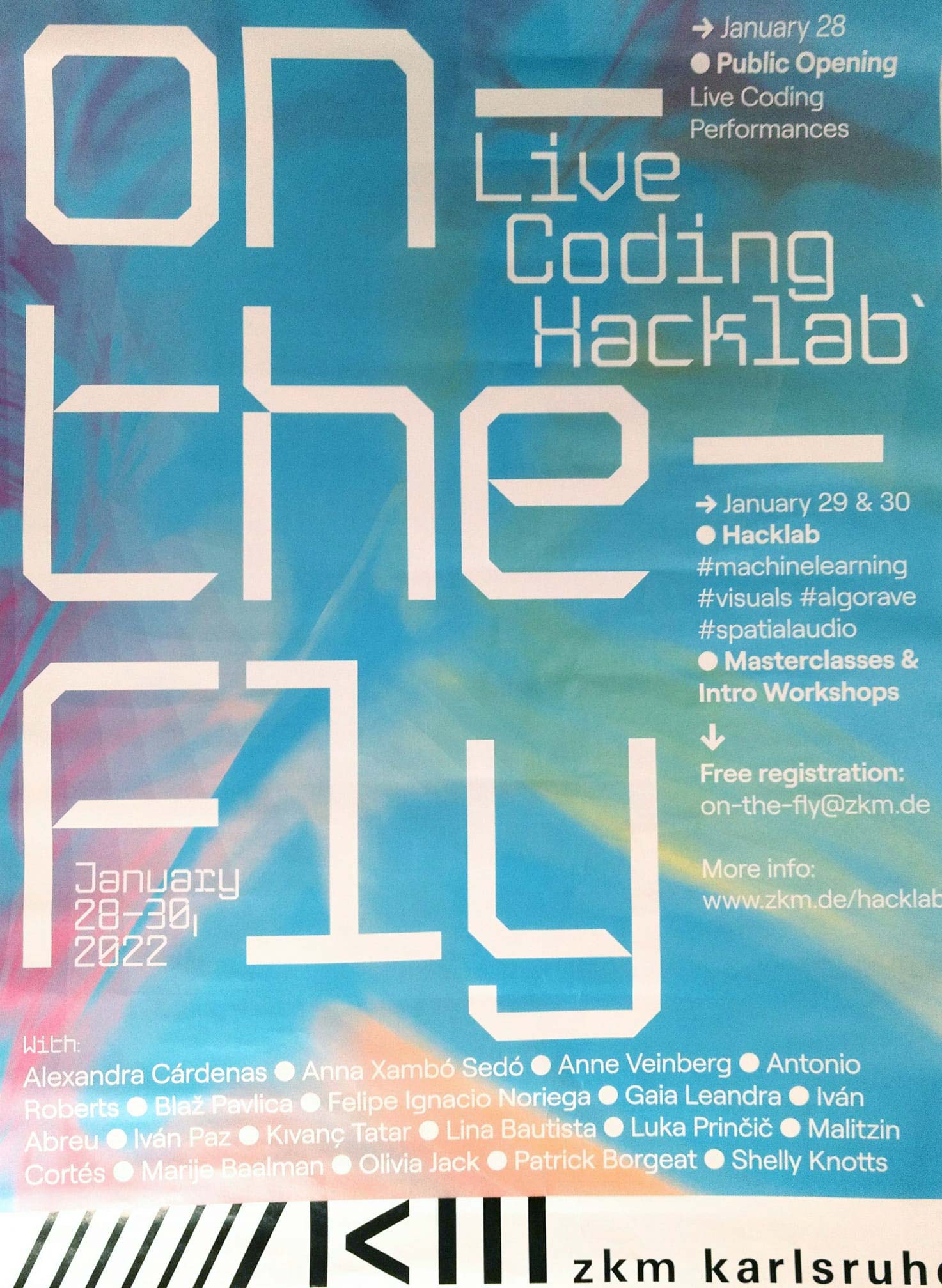 Poster on-the-fly: Live Coding Hacklab, January 28-30, 2022 at ZKM | Karlsruhe. Design by Caro Mikalef. On the last weekend of January, I was invited to Karlsruhe in Germany to be part of the event on-the-fly: Live Coding Hacklab at ZKM | Karlsruhe. My role was to be a mentor of machine learning in live coding together with Iván Paz (Toplap Barcelona / Hangar). The idea was to offer a flexible and fluid approach to the topic, where the Hacklab participants could attend the session at any time during the two days of the event. After each day, the participants were invited to showcase their progress as evening presentations and from scratch sessions. The brief of the event was the following: On January 29 and 30, an open Hacklab will take place at the ZKM | Hertz-Lab for all coding enthusiasts who want to explore live coding and code collaboratively together with international experts. In...
Read more
Poster on-the-fly: Live Coding Hacklab, January 28-30, 2022 at ZKM | Karlsruhe. Design by Caro Mikalef. On the last weekend of January, I was invited to Karlsruhe in Germany to be part of the event on-the-fly: Live Coding Hacklab at ZKM | Karlsruhe. My role was to be a mentor of machine learning in live coding together with Iván Paz (Toplap Barcelona / Hangar). The idea was to offer a flexible and fluid approach to the topic, where the Hacklab participants could attend the session at any time during the two days of the event. After each day, the participants were invited to showcase their progress as evening presentations and from scratch sessions. The brief of the event was the following: On January 29 and 30, an open Hacklab will take place at the ZKM | Hertz-Lab for all coding enthusiasts who want to explore live coding and code collaboratively together with international experts. In...
Read more
-
Future Research Leaders Programme Session 3
 Coral reef ecosystem. Author: Jerry Reid. License: Public domain (https://en.wikipedia.org/wiki/Public_domain). Image source: https://commons.wikimedia.org Analysing Successful REF Performances: UoAs and Individuals This third session has taken place on January 19, 2022. The main topic of discussion has been the research environment looking at how the Research Excellence Framework (REF) measures a good research environment both in terms of quantitative and qualitative measures, to then reflect on our research environment and how can we feasibly improve it. The session has been divided into blocks with small-group discussions that have been then reported back to the main group. Next, I will summarise the main points discussed in each of the two blocks. The first discussion block has been about what makes a good research environment in your unit of assessment (UoA). From REF 2014, we were tasked to analyse a successful environment statement from a relevant group of our field and UoA. We discussed the quantitative and qualitative...
Read more
Coral reef ecosystem. Author: Jerry Reid. License: Public domain (https://en.wikipedia.org/wiki/Public_domain). Image source: https://commons.wikimedia.org Analysing Successful REF Performances: UoAs and Individuals This third session has taken place on January 19, 2022. The main topic of discussion has been the research environment looking at how the Research Excellence Framework (REF) measures a good research environment both in terms of quantitative and qualitative measures, to then reflect on our research environment and how can we feasibly improve it. The session has been divided into blocks with small-group discussions that have been then reported back to the main group. Next, I will summarise the main points discussed in each of the two blocks. The first discussion block has been about what makes a good research environment in your unit of assessment (UoA). From REF 2014, we were tasked to analyse a successful environment statement from a relevant group of our field and UoA. We discussed the quantitative and qualitative...
Read more
-
Reflecting on 2021
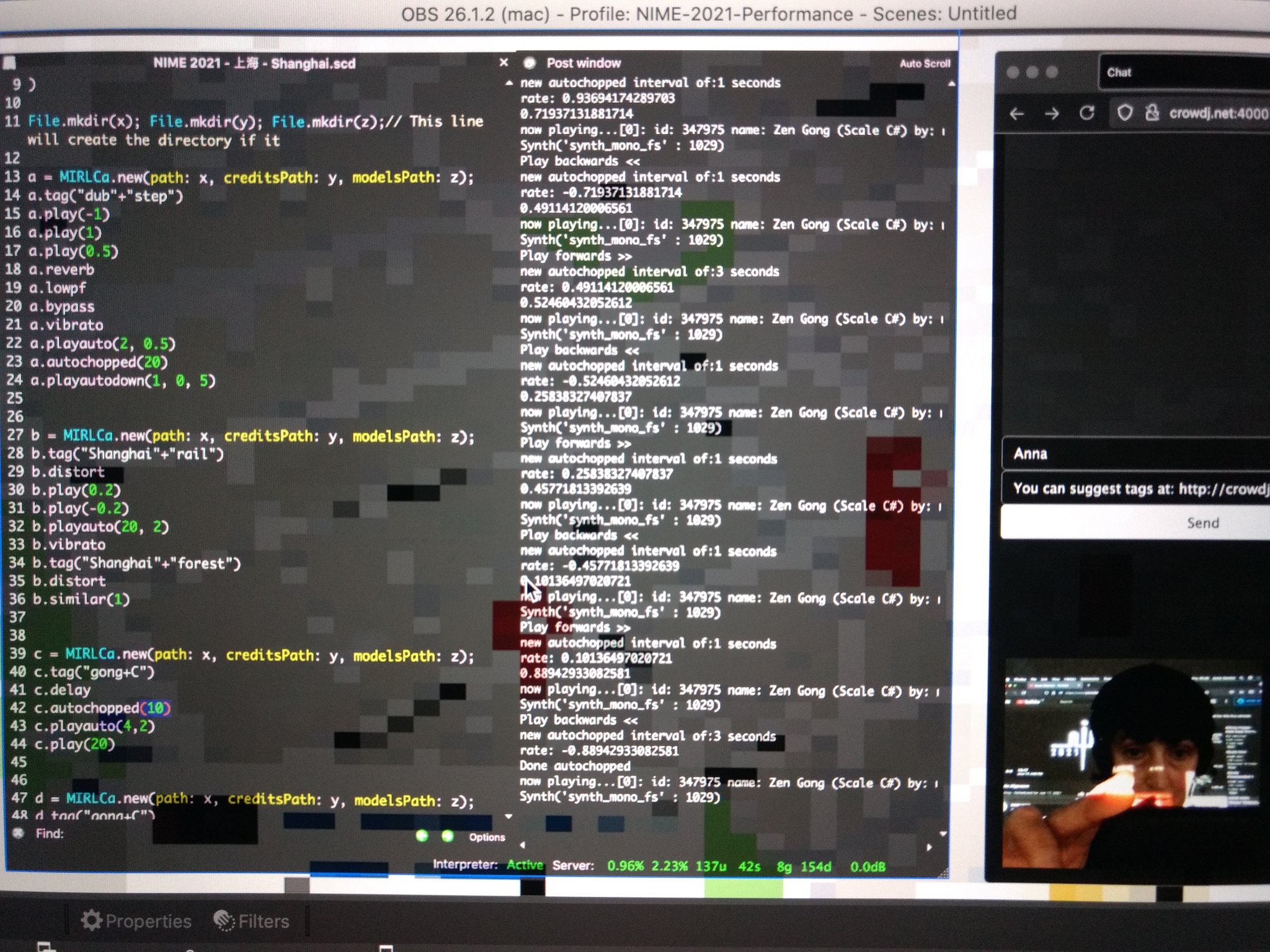 Figure 1. Anna Xambó's live set is ready for the algorave concert (hybrid format) at the NIME 2021 conference in Shanghai, China, streaming from Sheffield, UK. Last year I wrote Reflecting on 2020 discussing the global pandemic and how it changed our way of operating. We knew it was going to last a little bit longer, but we are ending this 2021 with (yet) another year with the pandemic in full. Trying to see the positive side of it, in this blog post, I will highlight my key activities of the year, reflect on how the year went and comment on what I would like to accomplish moving forward. Research Less is more. Since I am a lecturer, I do not have the time I used to have as a postdoc to do research. I can’t avoid feeling some frustration about the lack of research time. It is also true that the projects are of...
Read more
Figure 1. Anna Xambó's live set is ready for the algorave concert (hybrid format) at the NIME 2021 conference in Shanghai, China, streaming from Sheffield, UK. Last year I wrote Reflecting on 2020 discussing the global pandemic and how it changed our way of operating. We knew it was going to last a little bit longer, but we are ending this 2021 with (yet) another year with the pandemic in full. Trying to see the positive side of it, in this blog post, I will highlight my key activities of the year, reflect on how the year went and comment on what I would like to accomplish moving forward. Research Less is more. Since I am a lecturer, I do not have the time I used to have as a postdoc to do research. I can’t avoid feeling some frustration about the lack of research time. It is also true that the projects are of...
Read more
-
Future Research Leaders Programme Session 2
 Writing a letter with fountain pen. Author: Petar Milošević. License: CC BY-SA 3.0 (https://creativecommons.org/licenses/by-sa/3.0/deed.en). Image source: https://commons.wikimedia.org Developing Your Publication Strategy This second session took place on December 1, 2021, two weeks after the first session. Although I planned to write this blog post immediately after, it has been impossible until today. Time flies! The second session, “Developing your publication strategy”, was focused on discussing what are our target journals and monograph series, getting familiar with the Research Excellence Framework (REF), and commenting on our publishing strategy for beyond REF 2020. We first started with a quick round of updates. It was impressive how active my classmates are with grant submission, paper submission, new ideas, and new collaborations. This felt like an energising start to the session. As a warm-up activity, we discussed that it is important to be open-minded and resilient with the reviewing and publication processes. It is important to take criticism positively...
Read more
Writing a letter with fountain pen. Author: Petar Milošević. License: CC BY-SA 3.0 (https://creativecommons.org/licenses/by-sa/3.0/deed.en). Image source: https://commons.wikimedia.org Developing Your Publication Strategy This second session took place on December 1, 2021, two weeks after the first session. Although I planned to write this blog post immediately after, it has been impossible until today. Time flies! The second session, “Developing your publication strategy”, was focused on discussing what are our target journals and monograph series, getting familiar with the Research Excellence Framework (REF), and commenting on our publishing strategy for beyond REF 2020. We first started with a quick round of updates. It was impressive how active my classmates are with grant submission, paper submission, new ideas, and new collaborations. This felt like an energising start to the session. As a warm-up activity, we discussed that it is important to be open-minded and resilient with the reviewing and publication processes. It is important to take criticism positively...
Read more
-
Future Research Leaders Programme Session 1
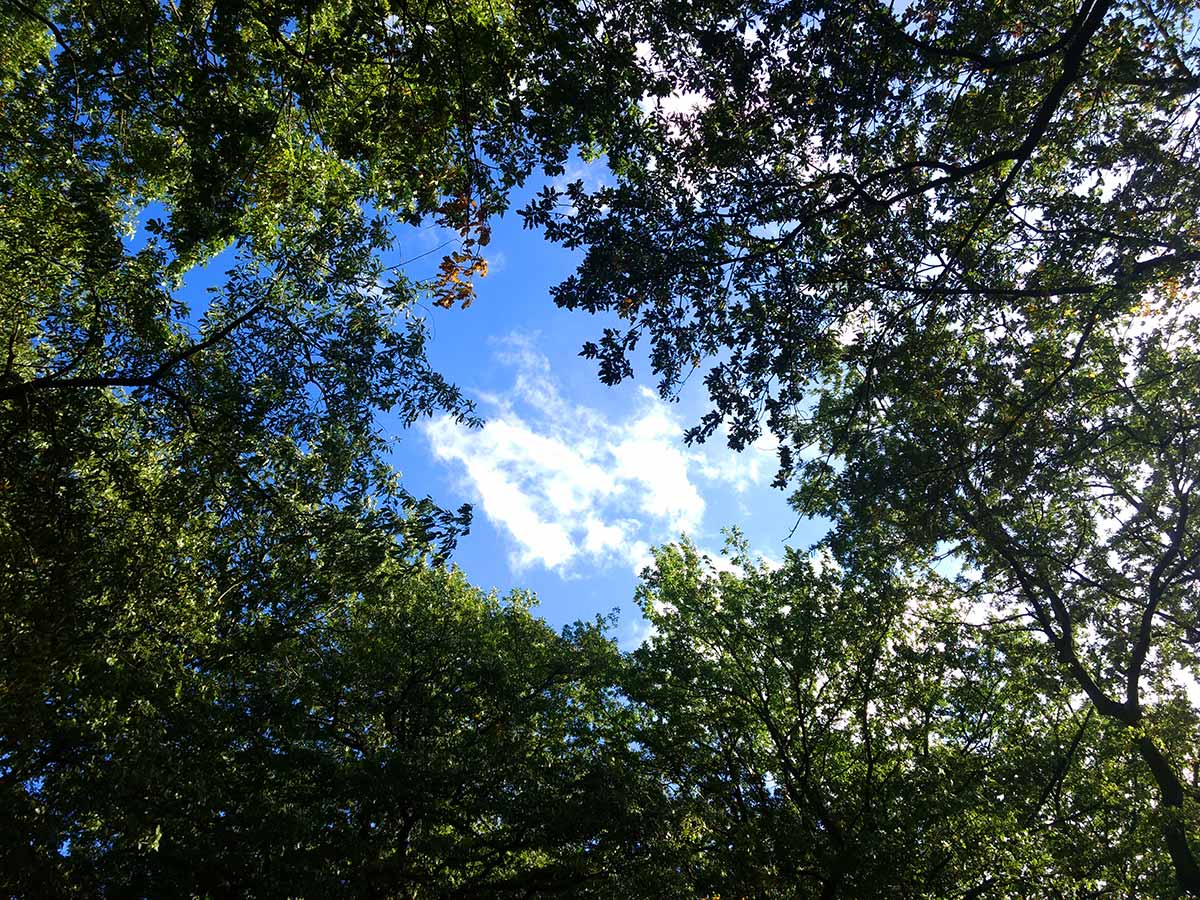 Blue sky. Photo by Anna Xambó. Getting to Know Each Other This 2021/22 academic year I have been selected to be part of The Vice-Chancellor’s Future Research Leaders (FRL8) Programme at De Montfort University. The goal of this programme is to help raise the strategic research competence of a specially selected cohort within the university to become leading researchers in the university. As part of the FRL Programme, each cohort member has been awarded up to £1,000 development fund. I feel privileged and honoured as well as proud to represent music technology in this initiative. The programme is led by Professor Mike Baynham from the University of Leeds and is scheduled for a period of ten months. I’ve decided to blog about the whole process as a way to reflect on the experience and to share with others the lessons learned. This blog post is about the first meeting. The first session, “Getting to know...
Read more
Blue sky. Photo by Anna Xambó. Getting to Know Each Other This 2021/22 academic year I have been selected to be part of The Vice-Chancellor’s Future Research Leaders (FRL8) Programme at De Montfort University. The goal of this programme is to help raise the strategic research competence of a specially selected cohort within the university to become leading researchers in the university. As part of the FRL Programme, each cohort member has been awarded up to £1,000 development fund. I feel privileged and honoured as well as proud to represent music technology in this initiative. The programme is led by Professor Mike Baynham from the University of Leeds and is scheduled for a period of ten months. I’ve decided to blog about the whole process as a way to reflect on the experience and to share with others the lessons learned. This blog post is about the first meeting. The first session, “Getting to know...
Read more
-
Teaching Audio Electronics during COVID: Inventiveness and Opportunities
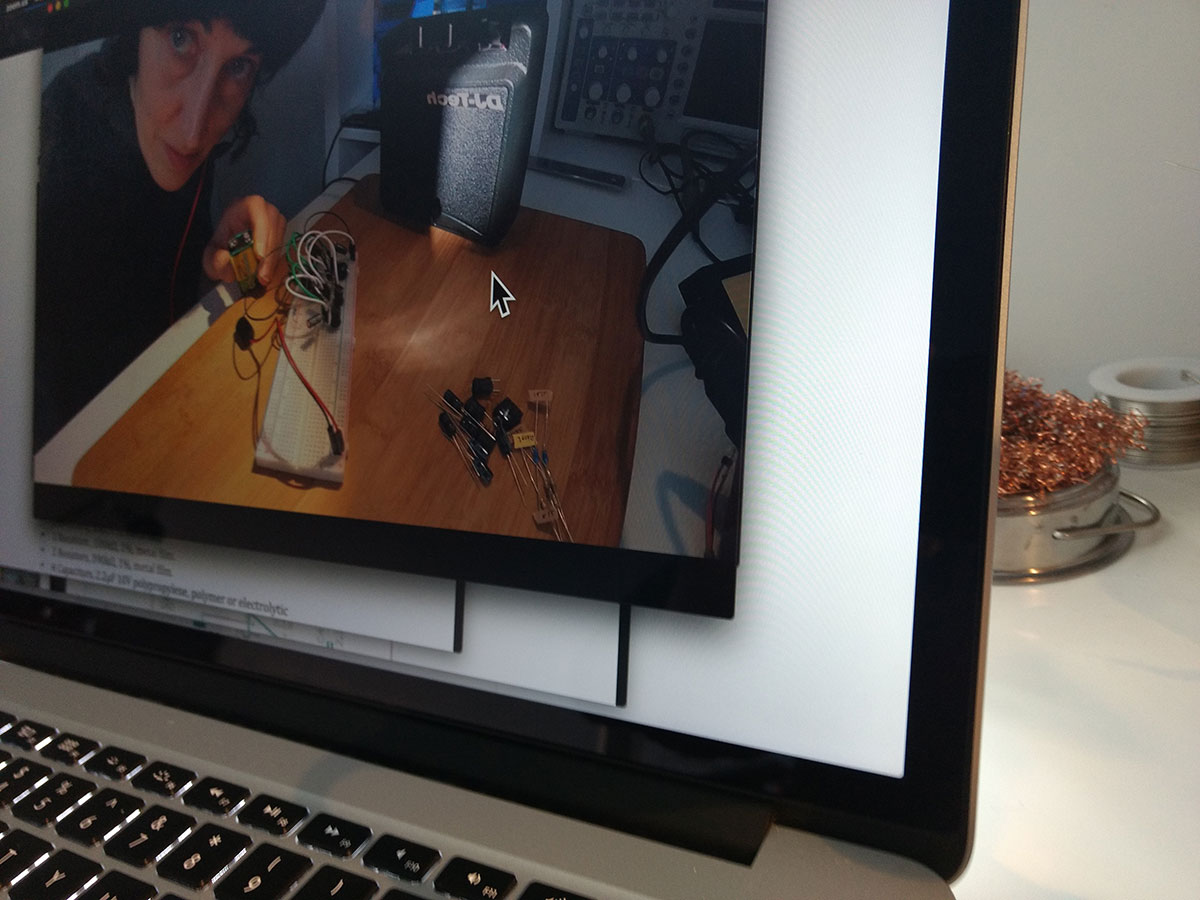 Figure 1. Anna Xambó setting up an online lab using a GoPro camera (webcam mode) connected to Blackboard Collaborate via Zoom. This semester I have been teaching for the second time the module TECH3011 Studio Technology: Audio Electronics at De Montfort University (DMU), which is a third-year undergraduate course in audio electronics that includes lectures and laboratories for 12 weeks in the Spring semester. The main difference with last year is that this time, due to the continued pandemic situation, it had to be delivered fully online (Figure 1), whilst last year we moved online during the last few weeks of the module. New additions of this year’s online edition have included (1) blogging as an optional activity using the module’s blog, (2) posting to students’ homes a prepared electronic kit based on the DIY Elektroslush device, which included a breadboard instead of a perfboard for safety reasons (Figure 2), and (3) using the professional...
Read more
Figure 1. Anna Xambó setting up an online lab using a GoPro camera (webcam mode) connected to Blackboard Collaborate via Zoom. This semester I have been teaching for the second time the module TECH3011 Studio Technology: Audio Electronics at De Montfort University (DMU), which is a third-year undergraduate course in audio electronics that includes lectures and laboratories for 12 weeks in the Spring semester. The main difference with last year is that this time, due to the continued pandemic situation, it had to be delivered fully online (Figure 1), whilst last year we moved online during the last few weeks of the module. New additions of this year’s online edition have included (1) blogging as an optional activity using the module’s blog, (2) posting to students’ homes a prepared electronic kit based on the DIY Elektroslush device, which included a breadboard instead of a perfboard for safety reasons (Figure 2), and (3) using the professional...
Read more
-
Reflecting on 2020
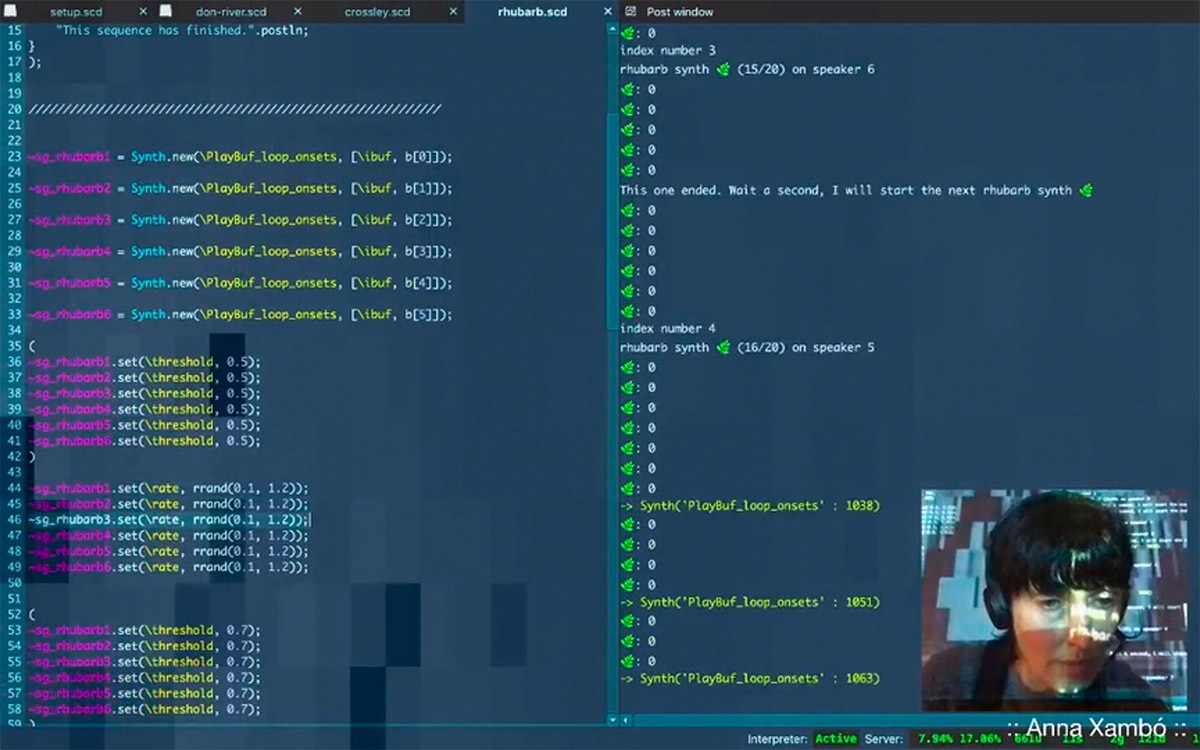 Figure 1. Anna Xambó live coding at Sound Junction Satellites: Live Coding & 3D Sounds. In this blog post, I will reflect on my work during 2020. It has been by far a different year. It has turned a historical year for a devastating global pandemic that has changed our lifestyle. For academics, this might have changed to a lesser extent, probably because many of the research activities were online already. However, other related activities such as teaching or performing have moved to new hybrid or online formats. It has been a year of considerable challenges but also opportunities to explore new ways of doing. At the beginning of the year, I started as a senior lecturer in music and audio technology at De Montfort University in Leicester, UK. Therefore, I started the year moving from Norway to the UK, as discussed in my last year’s blog post “Becoming a Woman Academic in Music and...
Read more
Figure 1. Anna Xambó live coding at Sound Junction Satellites: Live Coding & 3D Sounds. In this blog post, I will reflect on my work during 2020. It has been by far a different year. It has turned a historical year for a devastating global pandemic that has changed our lifestyle. For academics, this might have changed to a lesser extent, probably because many of the research activities were online already. However, other related activities such as teaching or performing have moved to new hybrid or online formats. It has been a year of considerable challenges but also opportunities to explore new ways of doing. At the beginning of the year, I started as a senior lecturer in music and audio technology at De Montfort University in Leicester, UK. Therefore, I started the year moving from Norway to the UK, as discussed in my last year’s blog post “Becoming a Woman Academic in Music and...
Read more
-
Creative Audio Programming for the Web with Tone.js: An Online Collaborative Workshop
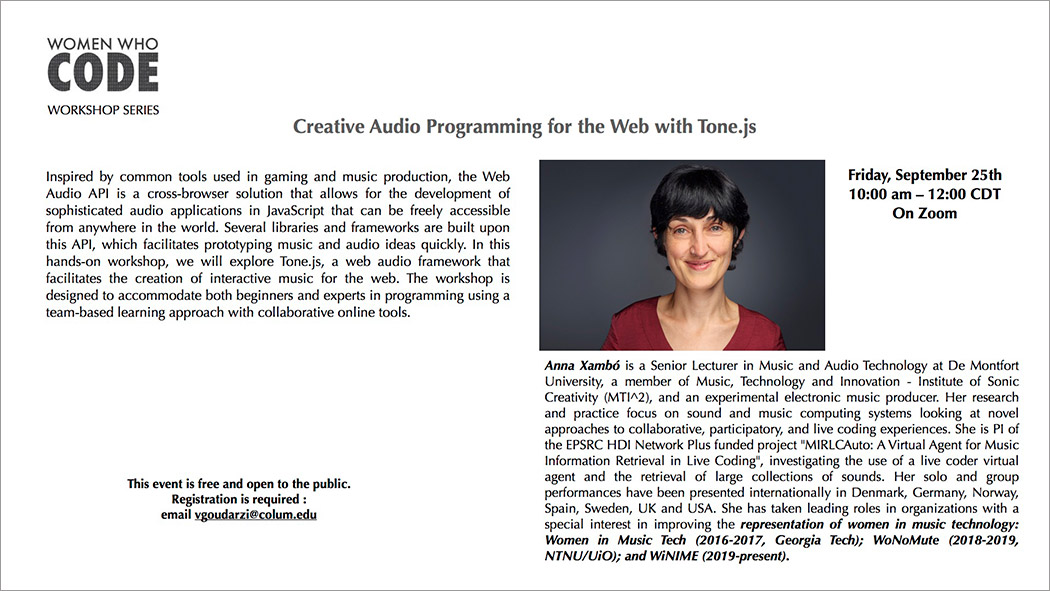 Poster of the workshop on web audio by Anna Xambó. 'Women Who Code' workshop series at the Audio Arts and Acoustics Department, Columbia College Chicago, IL, USA. We are still in one of the most disastrous crises of our time. However, life goes on where the academic year has started with the preparations for online/blended teaching. My first teaching experience of the semester has been with the online workshop “Creative Audio Programming for the Web with Tone.js” within the “Women Who Code” workshop series, organised by Dr Visda Goudarzi, at the School of Media Arts, Columbia College Chicago. This workshop aimed to show the potential of web audio through the framework Tone.js to both beginners and experts in programming using a team-based learning approach with collaborative online tools. We went from a quick round of introductions to experiencing the code in the browser using CodePen.io, to tinkering the code with Visual Studio Code and a...
Read more
Poster of the workshop on web audio by Anna Xambó. 'Women Who Code' workshop series at the Audio Arts and Acoustics Department, Columbia College Chicago, IL, USA. We are still in one of the most disastrous crises of our time. However, life goes on where the academic year has started with the preparations for online/blended teaching. My first teaching experience of the semester has been with the online workshop “Creative Audio Programming for the Web with Tone.js” within the “Women Who Code” workshop series, organised by Dr Visda Goudarzi, at the School of Media Arts, Columbia College Chicago. This workshop aimed to show the potential of web audio through the framework Tone.js to both beginners and experts in programming using a team-based learning approach with collaborative online tools. We went from a quick round of introductions to experiencing the code in the browser using CodePen.io, to tinkering the code with Visual Studio Code and a...
Read more
-
Streaming with liveSHOUT in the Woods
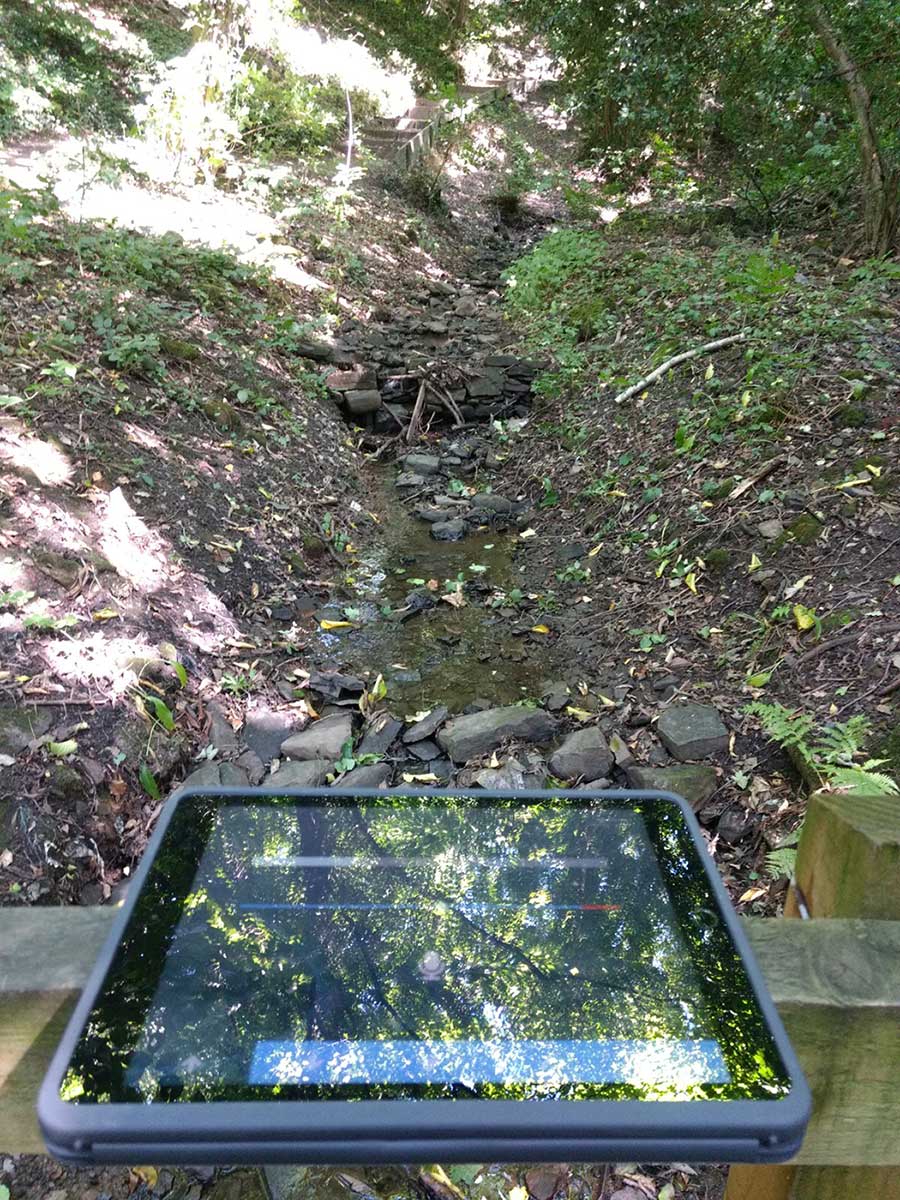 Streaming with liveSHOUT on iPad next to the stream in the ancient woodland of Norfolk Heritage Park. Photo by Anna Xambó. Today I performed for the piece Absurdity (concept by Franziska Schroeder and Matilde Meireles), a distributed performance using liveSHOUT (AHRC funded app developed by Franziska Schroeder and Pedro Rebelo) with members from the Female Laptop Orchestra (FLO). LiveSHOUT is a free mobile app for distributed listening that is available for either phone (e.g. iPhone, Android) or tablet (e.g. iPad). In this blog post, I will focus on explaining my setup for streaming outdoors using liveSHOUT and reflect on the experience. This performance has been part of the event Physically Distant #2: more online talks on telematic performance organised by Federico Visi. For this event, the FLO performers were: Franziska Schroeder – LiveSHOUT and Pessoa reading (English) Matilde Meireles – LiveSHOUT and Pessoa reading (Portuguese) Maria Mannone – LiveSHOUT streams of piano improv from Palermo...
Read more
Streaming with liveSHOUT on iPad next to the stream in the ancient woodland of Norfolk Heritage Park. Photo by Anna Xambó. Today I performed for the piece Absurdity (concept by Franziska Schroeder and Matilde Meireles), a distributed performance using liveSHOUT (AHRC funded app developed by Franziska Schroeder and Pedro Rebelo) with members from the Female Laptop Orchestra (FLO). LiveSHOUT is a free mobile app for distributed listening that is available for either phone (e.g. iPhone, Android) or tablet (e.g. iPad). In this blog post, I will focus on explaining my setup for streaming outdoors using liveSHOUT and reflect on the experience. This performance has been part of the event Physically Distant #2: more online talks on telematic performance organised by Federico Visi. For this event, the FLO performers were: Franziska Schroeder – LiveSHOUT and Pessoa reading (English) Matilde Meireles – LiveSHOUT and Pessoa reading (Portuguese) Maria Mannone – LiveSHOUT streams of piano improv from Palermo...
Read more
-
Performing Audiences at NIME 2020
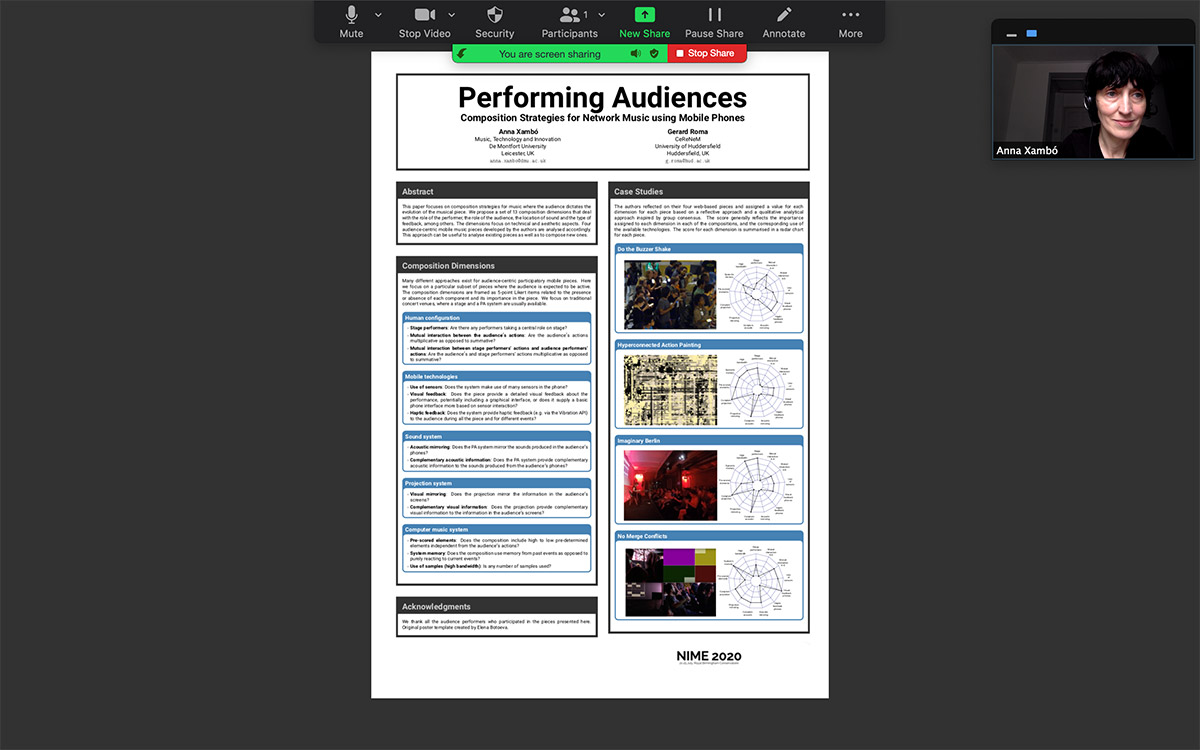 Screenshot of the online poster presentation of our paper Performing Audiences during NIME 2020. Following up my participation in the NIME workshop NIME Publication Ecosystem Workshop, today I presented our paper: Xambó, A., Roma, G. (2020) “Performing Audiences: Composition Strategies for Network Music using Mobile Phones”. Proceedings of the New Interfaces for Musical Expression (NIME ’20). Birmingham, UK. pp. 55-60. Abstract: With the development of web audio standards, it has quickly become technically easy to develop and deploy software for inviting audiences to participate in musical performances using their mobile phones. Thus, a new audience-centric musical genre has emerged, which aligns with artistic manifestations where there is an explicit inclusion of the public (e.g. participatory art, cinema or theatre). Previous research has focused on analysing this new genre from historical, social organisation and technical perspectives. This follow-up paper contributes with reflections on technical and aesthetic aspects of composing within this audience-centric approach. We propose a...
Read more
Screenshot of the online poster presentation of our paper Performing Audiences during NIME 2020. Following up my participation in the NIME workshop NIME Publication Ecosystem Workshop, today I presented our paper: Xambó, A., Roma, G. (2020) “Performing Audiences: Composition Strategies for Network Music using Mobile Phones”. Proceedings of the New Interfaces for Musical Expression (NIME ’20). Birmingham, UK. pp. 55-60. Abstract: With the development of web audio standards, it has quickly become technically easy to develop and deploy software for inviting audiences to participate in musical performances using their mobile phones. Thus, a new audience-centric musical genre has emerged, which aligns with artistic manifestations where there is an explicit inclusion of the public (e.g. participatory art, cinema or theatre). Previous research has focused on analysing this new genre from historical, social organisation and technical perspectives. This follow-up paper contributes with reflections on technical and aesthetic aspects of composing within this audience-centric approach. We propose a...
Read more
-
Reflections on Online Publication Ecosystems: Three Case Studies
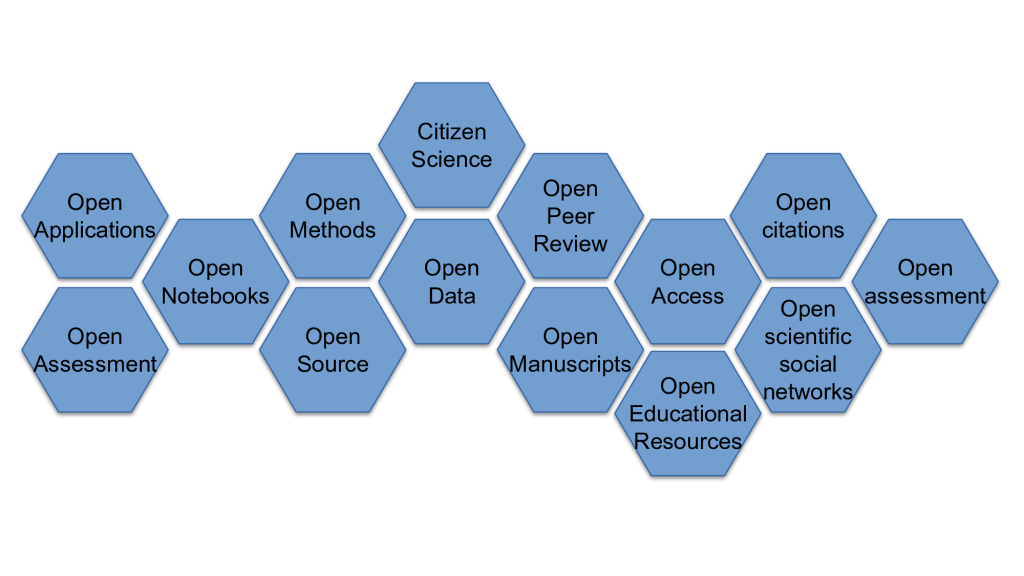 Diagram that represents the vision of an open publication ecosystem for NIME. Image source: nime2020.bcu.ac.uk It is an honour to be part of the NIME workshop NIME Publication Ecosystem Workshop, to be held next week on Tuesday 21 July, 2020. This workshop is organised by Alexander Refsum Jensenius (University of Oslo), Andrew McPherson (Queen Mary University of London), Anna Xambó (De Montfort University), Charles Martin (Australian National University), Jack Armitage (Queen Mary University of London), Niccolò Granieri (Birmingham City University), Rebecca Fiebrink (University of the Arts London) and Luiz Naveda (State University of Minas Gerais). This workshop is a follow-up of previous discussions at NIME, such as NIMEHub in 2016 and Open NIME in 2019, with the aim at discussing publication strategies that can improve the NIME publication ecosystem looking forward. In preparation for the NIME 2020 Publication Ecosystem Workshop, the workshop organisers and attendees have been invited to share their thoughts beforehand à la...
Read more
Diagram that represents the vision of an open publication ecosystem for NIME. Image source: nime2020.bcu.ac.uk It is an honour to be part of the NIME workshop NIME Publication Ecosystem Workshop, to be held next week on Tuesday 21 July, 2020. This workshop is organised by Alexander Refsum Jensenius (University of Oslo), Andrew McPherson (Queen Mary University of London), Anna Xambó (De Montfort University), Charles Martin (Australian National University), Jack Armitage (Queen Mary University of London), Niccolò Granieri (Birmingham City University), Rebecca Fiebrink (University of the Arts London) and Luiz Naveda (State University of Minas Gerais). This workshop is a follow-up of previous discussions at NIME, such as NIMEHub in 2016 and Open NIME in 2019, with the aim at discussing publication strategies that can improve the NIME publication ecosystem looking forward. In preparation for the NIME 2020 Publication Ecosystem Workshop, the workshop organisers and attendees have been invited to share their thoughts beforehand à la...
Read more
-
Live Coding at the Network Music Festival 2020
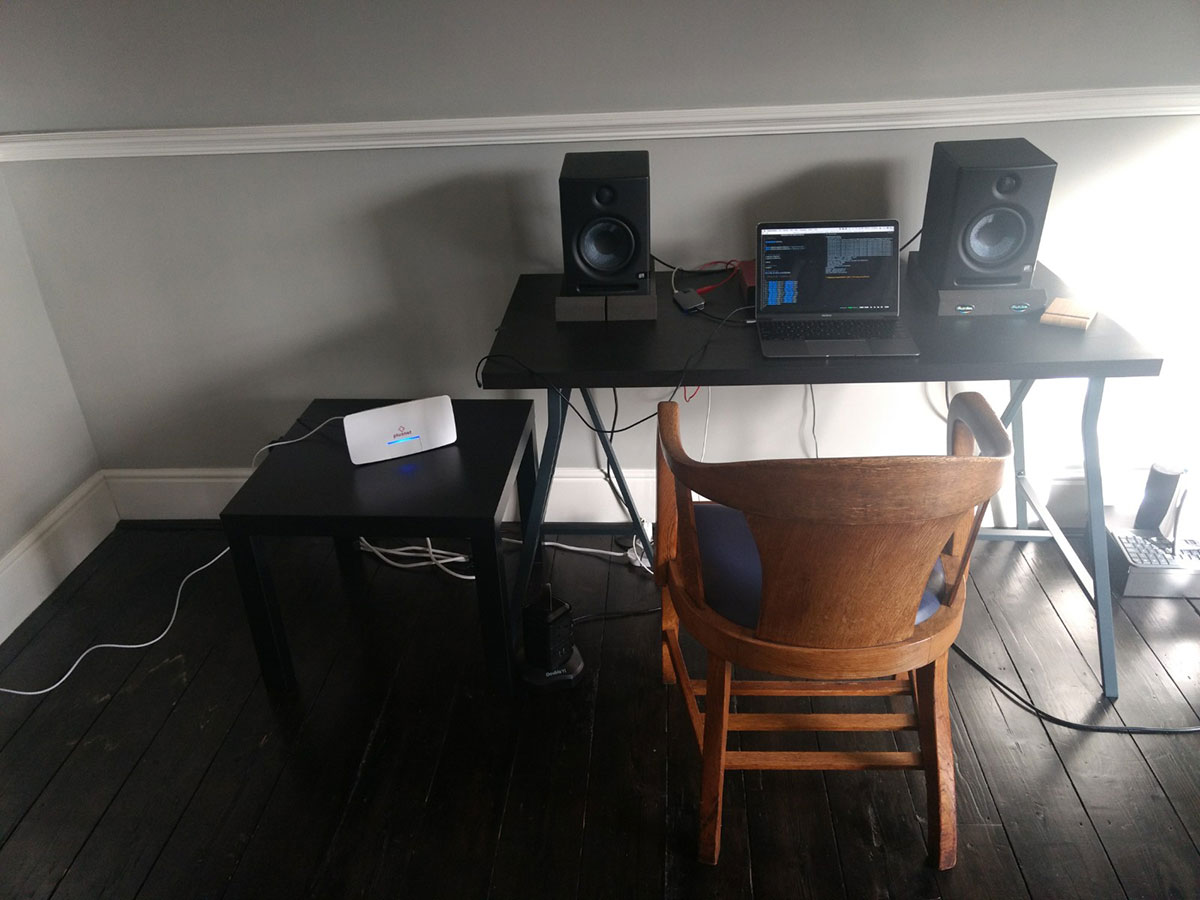 Setup for the live coding session by Anna Xambó at the Network Music Festival 2020. It has been a real pleasure to be part of the Network Music Festival 2020 and contribute with one performance out of more than 50 performances from all around the world to a festival that has pushed the boundaries to what it might be a new way of conferencing and festivaling. It has been a brilliant, cutting-edge and timely festival with creative solutions to cope with the pandemics lockdown situation. The 2 algoraves in VR spaces is the perfect example of how we can integrate new technologies to create new ways of experiencing music and enhancing the flat 2D communication that we are used to with the more traditional video and web conferencing tools. The festival has runned on the principle of mutual aid and free-to-view donate-what-you-can, which is also very important to allow for diversity and inclusivity. Thanks to...
Read more
Setup for the live coding session by Anna Xambó at the Network Music Festival 2020. It has been a real pleasure to be part of the Network Music Festival 2020 and contribute with one performance out of more than 50 performances from all around the world to a festival that has pushed the boundaries to what it might be a new way of conferencing and festivaling. It has been a brilliant, cutting-edge and timely festival with creative solutions to cope with the pandemics lockdown situation. The 2 algoraves in VR spaces is the perfect example of how we can integrate new technologies to create new ways of experiencing music and enhancing the flat 2D communication that we are used to with the more traditional video and web conferencing tools. The festival has runned on the principle of mutual aid and free-to-view donate-what-you-can, which is also very important to allow for diversity and inclusivity. Thanks to...
Read more
-
Collaborative/Participatory Music Experiences: A Dialogue Between SMC and HCI
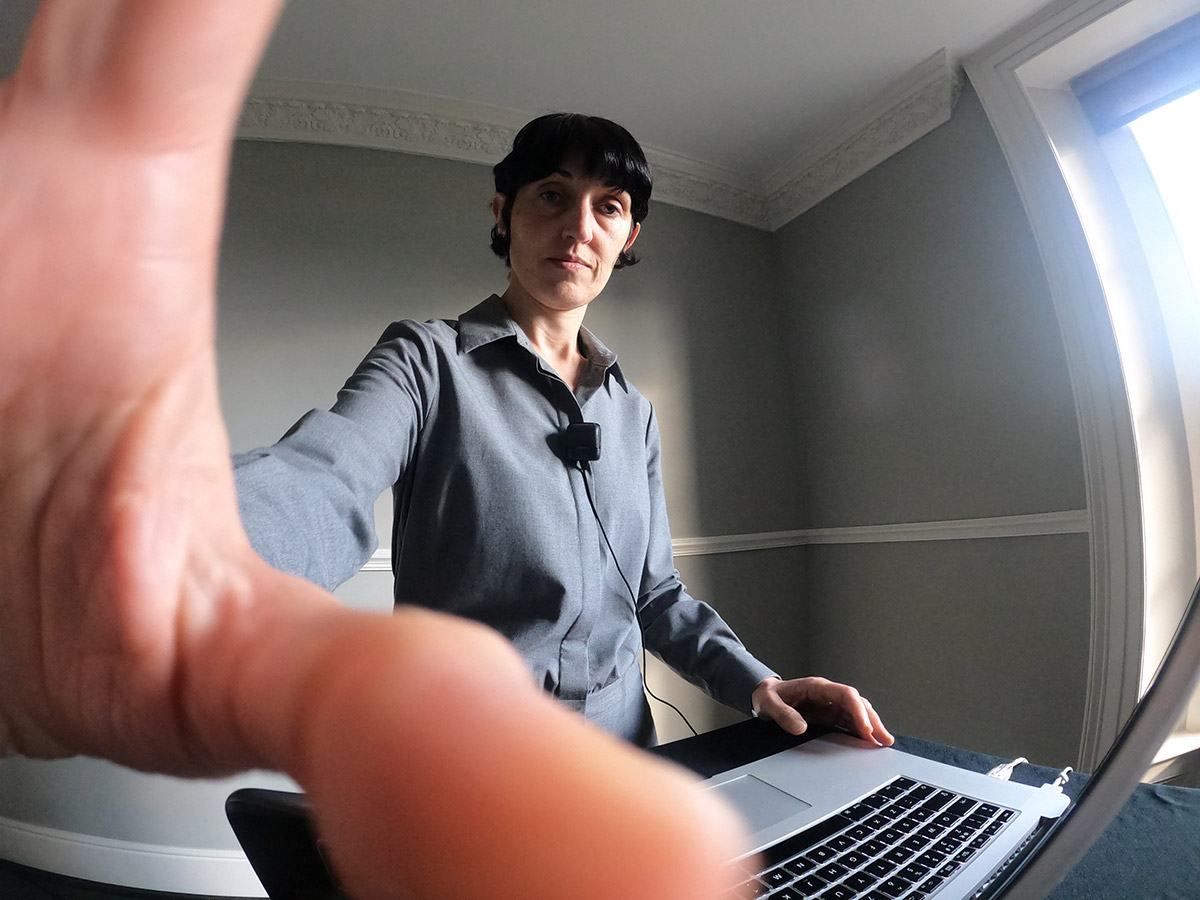 Anna Xambó during the 'making off' of the video-recorded SMC 2020 keynote. This is a brief follow-up of my keynote at the Sound and Music Computing 2020 conference. It has been a great honour to give the open keynote of the Sound and Music Computing 2020 conference (24-26 June, 2020). Due to COVID-19, the organisers of SMC 2020 have come up with an excellent alternative virtual conference, where video presentations are combined with live Q&A sessions. I am very happy to be part of this adventure on finding alternatives to traditional conferencing. The whole process of preparing this keynote has been both intense and rewarding. And, as always, talking to people is essential! We have shared discoveries and progress with Pierre Alexandre Tremblay, who is giving his keynote “A Beautiful Mess: tales of in-between-ness in SMC research” on Friday 26 June 2020, don’t miss it! We have also discussed ideas with my DMU colleagues during...
Read more
Anna Xambó during the 'making off' of the video-recorded SMC 2020 keynote. This is a brief follow-up of my keynote at the Sound and Music Computing 2020 conference. It has been a great honour to give the open keynote of the Sound and Music Computing 2020 conference (24-26 June, 2020). Due to COVID-19, the organisers of SMC 2020 have come up with an excellent alternative virtual conference, where video presentations are combined with live Q&A sessions. I am very happy to be part of this adventure on finding alternatives to traditional conferencing. The whole process of preparing this keynote has been both intense and rewarding. And, as always, talking to people is essential! We have shared discoveries and progress with Pierre Alexandre Tremblay, who is giving his keynote “A Beautiful Mess: tales of in-between-ness in SMC research” on Friday 26 June 2020, don’t miss it! We have also discussed ideas with my DMU colleagues during...
Read more
-
Network Music Performance During COVID-19 and Beyond: A Quick Review of Available Software
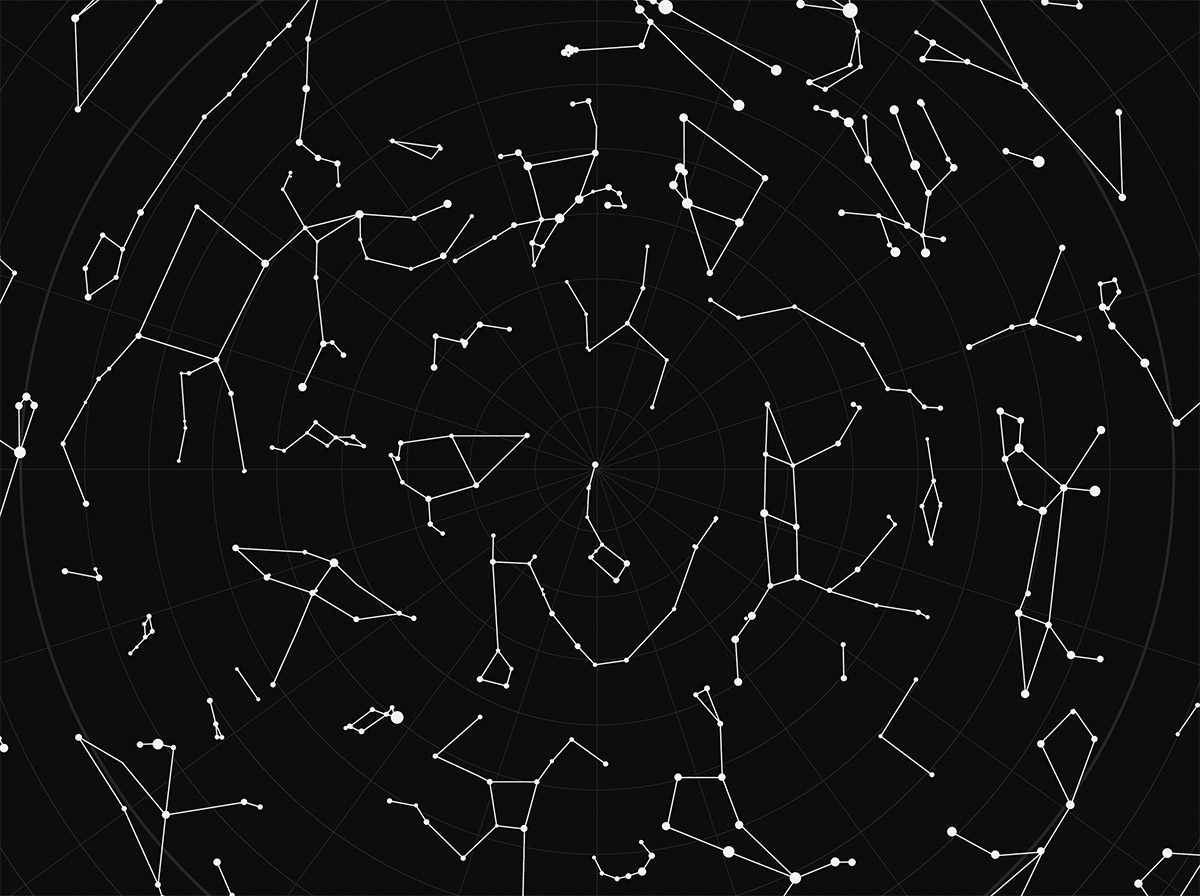 Networks of stars: Northern sky with constellations. Illustration by Vecteezy. During this COVID-19 period with an unprecedented global lockdown, I’ve been asked for advice about suitable software to use for online concert collaboration. This blog post is an illustrative list of available software, which might be useful to others not only for this period, which hopefully will end up soon, but also for the next future where we might need the keep a scenario of physical distance as the new norm. What makes a good software for network music performance or telematic performance? When selecting the software for network music performance (NMP),1 it is worth mentioning two criteria that you might check before making a decision, based on what it is commonly expected from a computational system that supports collaboration, particularly collaborative performance:2 Low latency:3 In computational systems, latency refers to any delay during the transmission of information from the sender to the receiver. It...
Read more
Networks of stars: Northern sky with constellations. Illustration by Vecteezy. During this COVID-19 period with an unprecedented global lockdown, I’ve been asked for advice about suitable software to use for online concert collaboration. This blog post is an illustrative list of available software, which might be useful to others not only for this period, which hopefully will end up soon, but also for the next future where we might need the keep a scenario of physical distance as the new norm. What makes a good software for network music performance or telematic performance? When selecting the software for network music performance (NMP),1 it is worth mentioning two criteria that you might check before making a decision, based on what it is commonly expected from a computational system that supports collaboration, particularly collaborative performance:2 Low latency:3 In computational systems, latency refers to any delay during the transmission of information from the sender to the receiver. It...
Read more
-
Becoming a Woman Academic in Music and Audio Technology
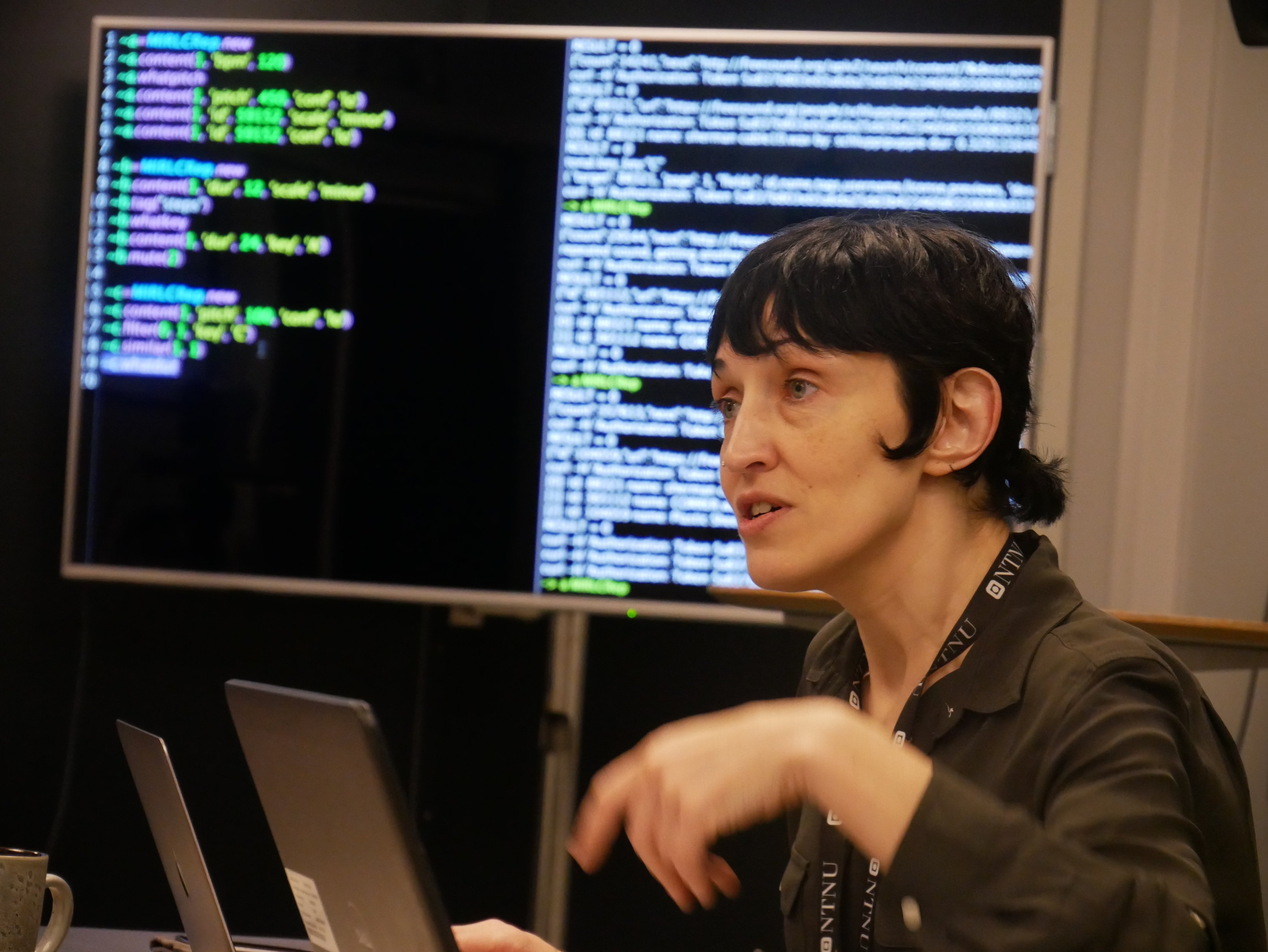 Figure 1. Anna Xambó presenting her work at the Erasmus and COST cooperation day at NTNU. Photo by Robin Støckert. To all the women interested in pursuing academic careers in music & audio technologies This blog post summarizes my last 17 months of work (August 2018 - December 2019), when I was appointed as an associate professor in music technology at the music technology group (mustekk), Department of Music (Institutt for musikk), Norwegian University of Science and Technology (NTNU) in Norway. After completing my PhD in 2015 at the Open University and two sequential postdoc positions at Georgia Tech and Queen Mary University of London, this was the first time I was offered a permanent position, which was a big achievement! I was also the first woman academic in the group. Then you realize that the nature of this change involves becoming a privileged person with responsibilities. That you can be an influential agent of...
Read more
Figure 1. Anna Xambó presenting her work at the Erasmus and COST cooperation day at NTNU. Photo by Robin Støckert. To all the women interested in pursuing academic careers in music & audio technologies This blog post summarizes my last 17 months of work (August 2018 - December 2019), when I was appointed as an associate professor in music technology at the music technology group (mustekk), Department of Music (Institutt for musikk), Norwegian University of Science and Technology (NTNU) in Norway. After completing my PhD in 2015 at the Open University and two sequential postdoc positions at Georgia Tech and Queen Mary University of London, this was the first time I was offered a permanent position, which was a big achievement! I was also the first woman academic in the group. Then you realize that the nature of this change involves becoming a privileged person with responsibilities. That you can be an influential agent of...
Read more
-
Future Of The Music Industries
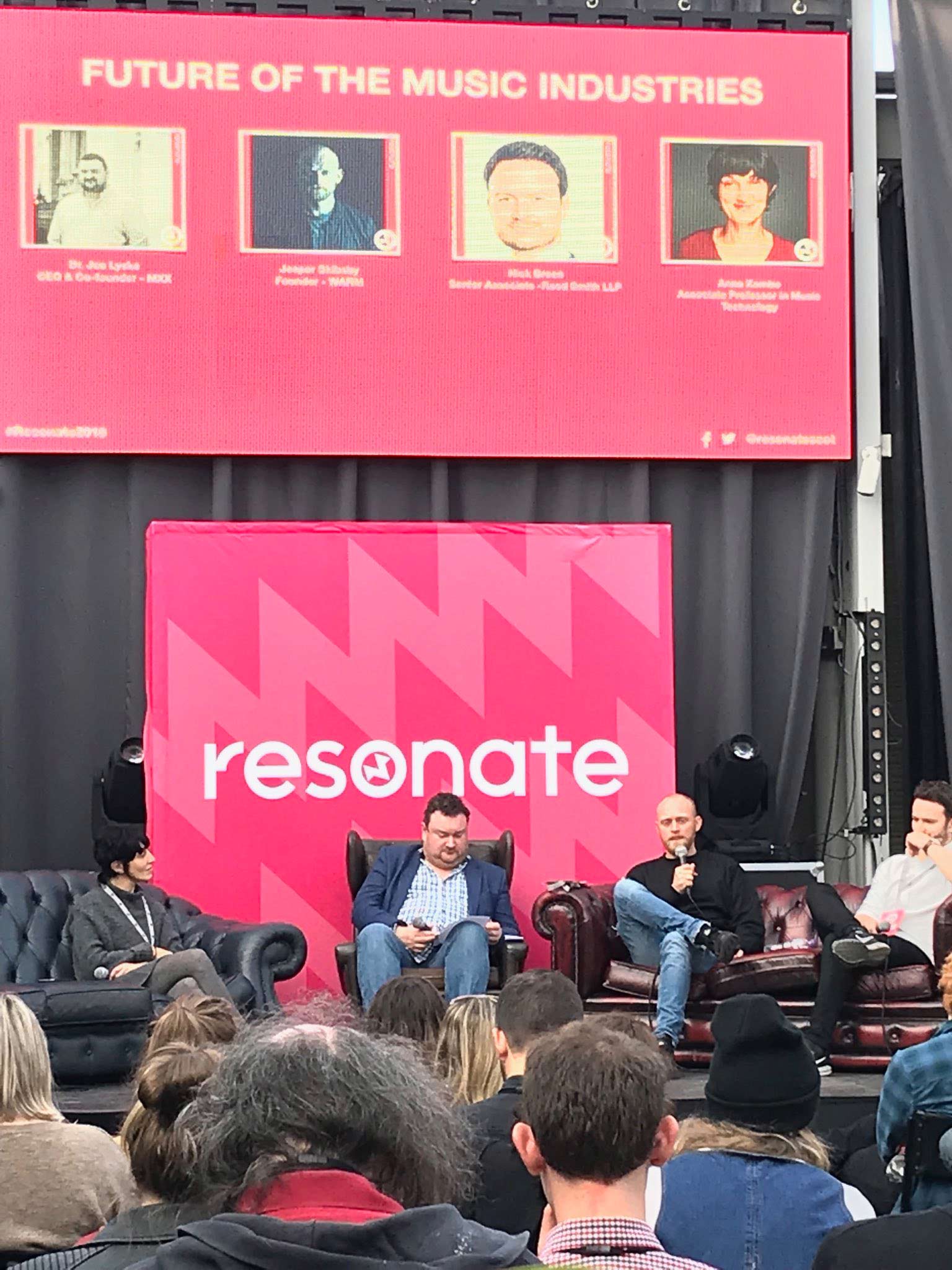 Figure 1. Our panel Future Of The Music Industries. From left to right: Anna Xambó, Joe Lyske, Jesper Skibsby and Nick Breen. Photo by Jonathan Tait. This year has been especially busy, where among a range of activities, I have participated in 5 panels (all related to music technology)! This blog post summarizes my participation and insights on the second last panel of the year “Future Of The Music Industries” (November 15, 2018) with Joe Lyske (chair, MXX), Jesper Skibsby (panelist, WARM), Nick Breen (panelist, Reed Smith) and I (panelist, Norwegian University of Science and Technology (NTNU)) during the Resonate Music Industry Conference 2018, held at Barras Art and Design (BAAD), Glasgow, Scotland, UK. The latest panel of the year that I participated was held on November 21, 2018, at the Sonic Arts Research Center, and it was about “Women in Music Technology around the World” (full video available online), which is somehow related to...
Read more
Figure 1. Our panel Future Of The Music Industries. From left to right: Anna Xambó, Joe Lyske, Jesper Skibsby and Nick Breen. Photo by Jonathan Tait. This year has been especially busy, where among a range of activities, I have participated in 5 panels (all related to music technology)! This blog post summarizes my participation and insights on the second last panel of the year “Future Of The Music Industries” (November 15, 2018) with Joe Lyske (chair, MXX), Jesper Skibsby (panelist, WARM), Nick Breen (panelist, Reed Smith) and I (panelist, Norwegian University of Science and Technology (NTNU)) during the Resonate Music Industry Conference 2018, held at Barras Art and Design (BAAD), Glasgow, Scotland, UK. The latest panel of the year that I participated was held on November 21, 2018, at the Sonic Arts Research Center, and it was about “Women in Music Technology around the World” (full video available online), which is somehow related to...
Read more
-
Collaborative Music Live Coding
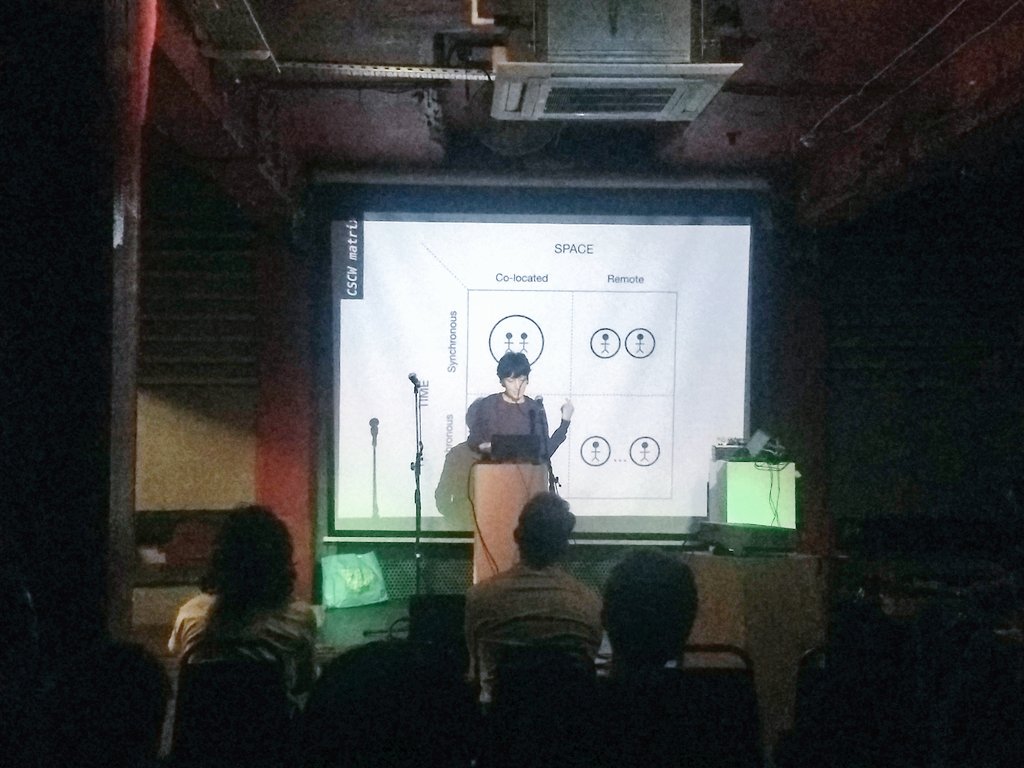 Figure 1. Lightning talk by Anna Xambó at The RAW, Café 1001, London. Photo by Inter/sections. This blog post is a follow-up summary of my lightning talk “Challenges and Opportunities of Collaborative Music Live Coding: A Practitioner’s Approach” presented at Café 1001 in London during in the event The RAW, Inter/sections 2018: “The RAW focusses on Live Coding and code based approaches to the real time creation of sound and image. For those yet to make its acquaintance, Live Coding is the creation of sonic or visual content generated through the execution of computer code in real time”. CSCM, Network Music and CMLC When discussing about CMLC, I always like to refer to the context of collaborative music live coding (CMLC) drawing from the areas of computer-supported collaborative work (CSCW) and the CSCW time/space matrix that Álvaro Barbosa adapted to computer-supported collaborative music (CSCM) (Figure 1). This matrix shows that collaboration can take many forms,...
Read more
Figure 1. Lightning talk by Anna Xambó at The RAW, Café 1001, London. Photo by Inter/sections. This blog post is a follow-up summary of my lightning talk “Challenges and Opportunities of Collaborative Music Live Coding: A Practitioner’s Approach” presented at Café 1001 in London during in the event The RAW, Inter/sections 2018: “The RAW focusses on Live Coding and code based approaches to the real time creation of sound and image. For those yet to make its acquaintance, Live Coding is the creation of sonic or visual content generated through the execution of computer code in real time”. CSCM, Network Music and CMLC When discussing about CMLC, I always like to refer to the context of collaborative music live coding (CMLC) drawing from the areas of computer-supported collaborative work (CSCW) and the CSCW time/space matrix that Álvaro Barbosa adapted to computer-supported collaborative music (CSCM) (Figure 1). This matrix shows that collaboration can take many forms,...
Read more
-
Equality, Diversity, Gender in Music Technology
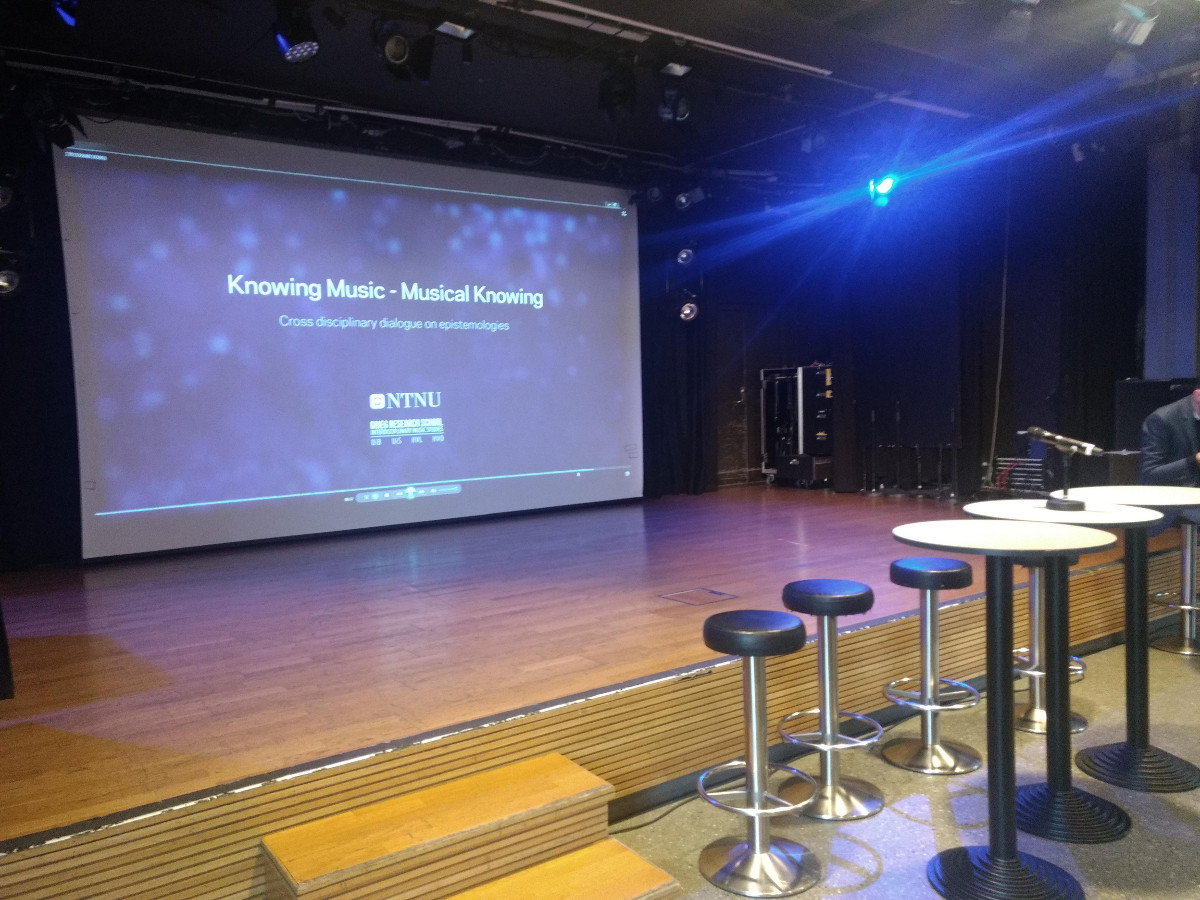 Figure 1. Our panel Equality, Diversity, Gender ready to start at Dokkhuset during the conference Knowing Music - Musical Knowing Cross disciplinary dialogue on epistemologies. On Friday October 26, 2018, I had the honor to be part of the panel “Equality, Diversity, Gender” (see program here) with Thomas Hilder (chair), Jill Diana Halstead Hjørnevik (panelist), Sunniva Skjøstad Hovde (panelist), Vivian Anette Lagesen (panelist), and myself (panelist). This panel was held during the conference Knowing Music - Musical Knowing Cross disciplinary dialogue on epistemologies, organized by the International Music Research School (Norwegian University of Science and Technology (NTNU), Trondheim) together with the Grieg Research School (Western Norway), and hosted at the fantastic Dokkhuset venue in Trondheim. Between the panel members, we had in common our backgrounds related to music as well as work around equality, diversity and gender. At the same time, the background of the panel members was interdisciplinary and diverse, including: musicology, ethnomusicology, anthropology,...
Read more
Figure 1. Our panel Equality, Diversity, Gender ready to start at Dokkhuset during the conference Knowing Music - Musical Knowing Cross disciplinary dialogue on epistemologies. On Friday October 26, 2018, I had the honor to be part of the panel “Equality, Diversity, Gender” (see program here) with Thomas Hilder (chair), Jill Diana Halstead Hjørnevik (panelist), Sunniva Skjøstad Hovde (panelist), Vivian Anette Lagesen (panelist), and myself (panelist). This panel was held during the conference Knowing Music - Musical Knowing Cross disciplinary dialogue on epistemologies, organized by the International Music Research School (Norwegian University of Science and Technology (NTNU), Trondheim) together with the Grieg Research School (Western Norway), and hosted at the fantastic Dokkhuset venue in Trondheim. Between the panel members, we had in common our backgrounds related to music as well as work around equality, diversity and gender. At the same time, the background of the panel members was interdisciplinary and diverse, including: musicology, ethnomusicology, anthropology,...
Read more
-
Improving Gender Balance in NIME Research
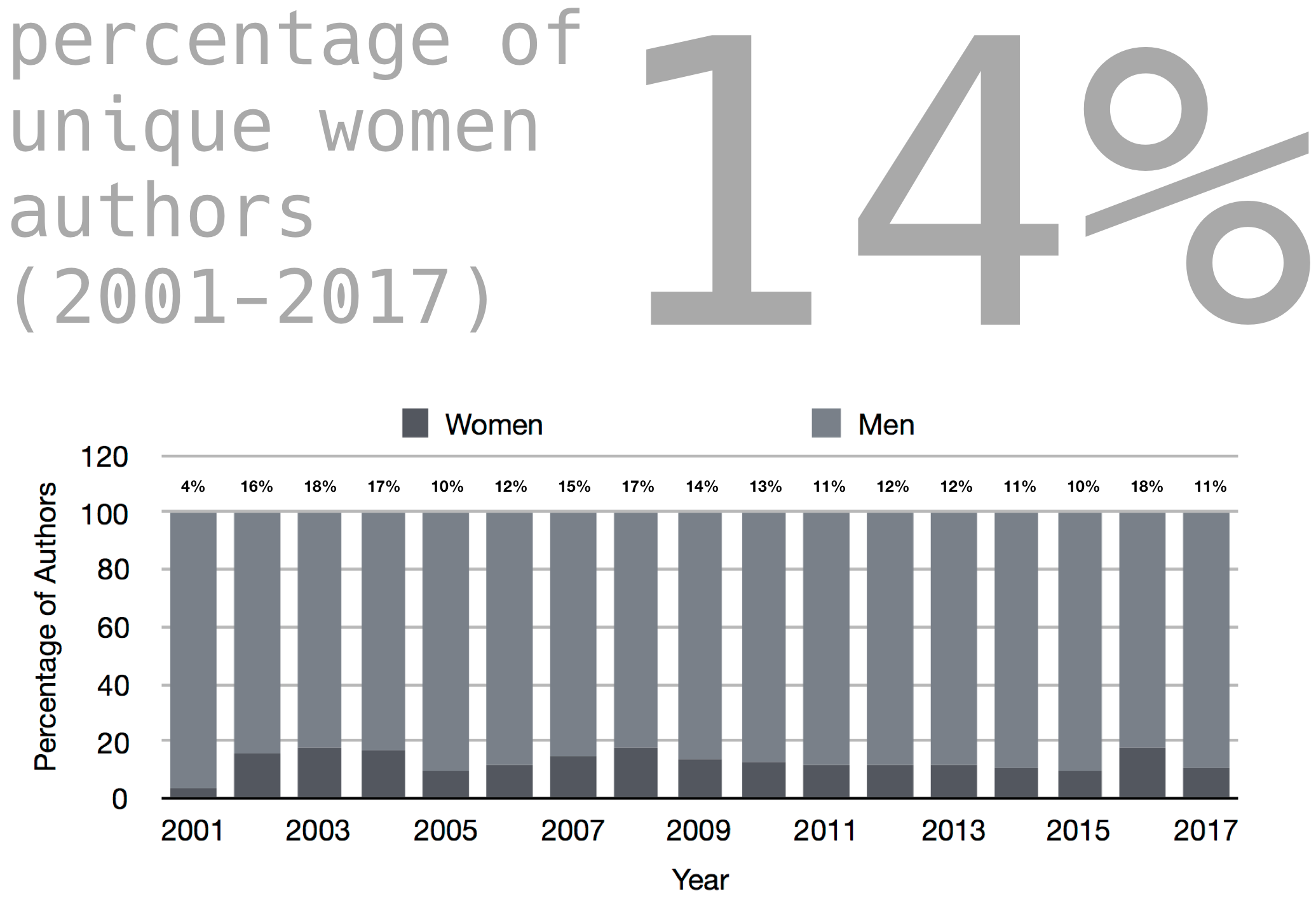 This blog post is the web page companion of the paper “Who Are the Women Authors in NIME? - Improving Gender Balance in NIME Research” (Xambó 2018). This paper looks at the underrepresentation of women at the New Interfaces for Musical Expression (NIME) conference and how we can improve the representation of women at NIME. In particular, it focuses on what has been the level of representation of women authors in NIME over the course of the years from 2001 to 2017 and whether there has been any improvement. This blog post highlights the descriptive statistics results to give some context to the directory of WiNIME. The reader is welcomed to explore the full paper to get a deeper sense of the current numbers and potential solutions. The selected bibliography used in this paper is also available online. The data source comes from the online proceedings of the NIME conference, which are publicly available on...
Read more
This blog post is the web page companion of the paper “Who Are the Women Authors in NIME? - Improving Gender Balance in NIME Research” (Xambó 2018). This paper looks at the underrepresentation of women at the New Interfaces for Musical Expression (NIME) conference and how we can improve the representation of women at NIME. In particular, it focuses on what has been the level of representation of women authors in NIME over the course of the years from 2001 to 2017 and whether there has been any improvement. This blog post highlights the descriptive statistics results to give some context to the directory of WiNIME. The reader is welcomed to explore the full paper to get a deeper sense of the current numbers and potential solutions. The selected bibliography used in this paper is also available online. The data source comes from the online proceedings of the NIME conference, which are publicly available on...
Read more
-
How to Represent the Umami Taste in Digital Performance?
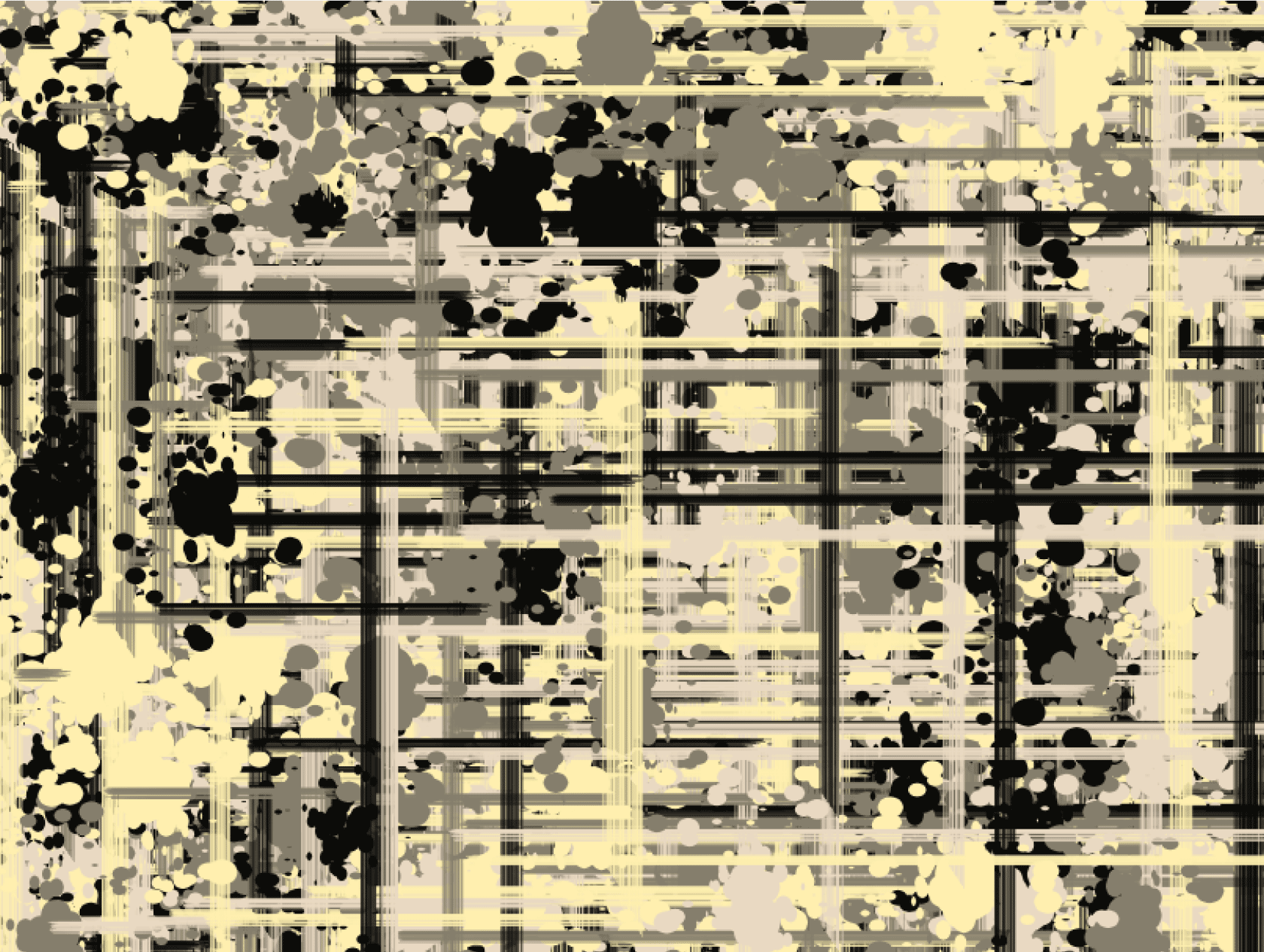 Figure 1. A participatory digital painting resulted from the piece Hyperconnected Action Painting (Anna Xambó & Gerard Roma) and inspired by Jackson Pollock's action painting technique. This blog post is inspired by a conversation with Thor Magnusson during his visit at Queen Mary University of London last week. We talked about his AHRC funded project Sonic Writing and the challenge of score representations for digital performance. It is a difficult endeavor to accurately represent in a timeline the act of a digital performance. Three examples of my latest collaborative work and practice in music technology show our attempts to represent the structure and content of our music tech pieces. In the rest of this blog post, I argue the reasons why we have not been successful yet, and the open questions that emerge toward finding a suitable anti-score representation of these new artistic forms. 1. Beacon Figure 2. A visual representation of composition and AV...
Read more
Figure 1. A participatory digital painting resulted from the piece Hyperconnected Action Painting (Anna Xambó & Gerard Roma) and inspired by Jackson Pollock's action painting technique. This blog post is inspired by a conversation with Thor Magnusson during his visit at Queen Mary University of London last week. We talked about his AHRC funded project Sonic Writing and the challenge of score representations for digital performance. It is a difficult endeavor to accurately represent in a timeline the act of a digital performance. Three examples of my latest collaborative work and practice in music technology show our attempts to represent the structure and content of our music tech pieces. In the rest of this blog post, I argue the reasons why we have not been successful yet, and the open questions that emerge toward finding a suitable anti-score representation of these new artistic forms. 1. Beacon Figure 2. A visual representation of composition and AV...
Read more
-
Girl Geeks
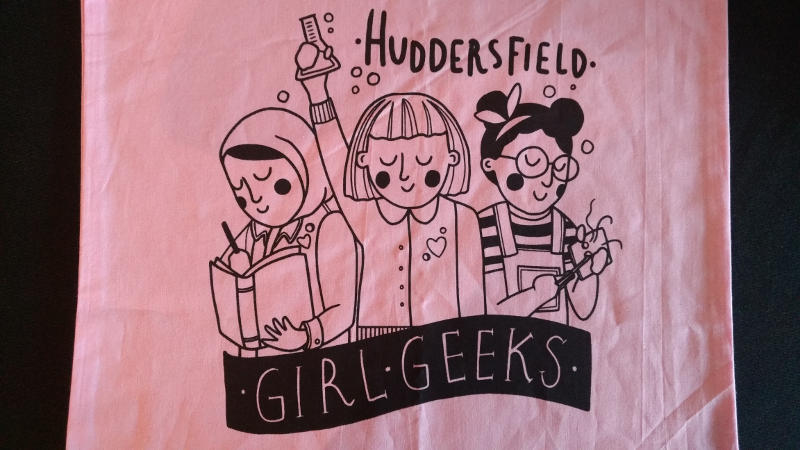 This weekend I have traveled from London to Huddersfield (UK) to lead one of the workshops programmed within the initiative Free creative digital workshops, held at the Kirklees Libraries. This initiative, organized by Huddersfield Girl Geeks, has consisted in a weekend of free digital making workshops for girls age 13 to 17, run by professionals “Girl Geeks”. Huddersfield Girl Geeks is a new network that supports, inspires, and unites girls and women interested in STEM (science, technology, engineering, maths), digital and coding, led by Amy Hearn. In the last two years, I have become more active in promoting music technology as a woman: first, participating to the Women in Sound / Women in Sound Conference at Lancaster University in April 2016 event as a keynote speaker and performer; second, co-founding the initiative of Women in Music Tech at Georgia Tech; and third, making more visible that there is a woman behind my artistic work. Through...
Read more
This weekend I have traveled from London to Huddersfield (UK) to lead one of the workshops programmed within the initiative Free creative digital workshops, held at the Kirklees Libraries. This initiative, organized by Huddersfield Girl Geeks, has consisted in a weekend of free digital making workshops for girls age 13 to 17, run by professionals “Girl Geeks”. Huddersfield Girl Geeks is a new network that supports, inspires, and unites girls and women interested in STEM (science, technology, engineering, maths), digital and coding, led by Amy Hearn. In the last two years, I have become more active in promoting music technology as a woman: first, participating to the Women in Sound / Women in Sound Conference at Lancaster University in April 2016 event as a keynote speaker and performer; second, co-founding the initiative of Women in Music Tech at Georgia Tech; and third, making more visible that there is a woman behind my artistic work. Through...
Read more
-
How Many Music Technology Research Centers Are There in the World?
This blog post is an ongoing research that attempts to answer the question of how many music technology research centers do exist around the world, referring to research centers that specialize in technologies applied to music and sound. The final aim is to display the research centers in a map and summarize the main lines of research for each center. Australia Creative Music Technology, Sir Zelman Cowen School of Music, Monash University, Melbourne Canada Music Technology, Faculty of Music, University of Toronto Centre for Interdisciplinary Research in Music Media and Technology (CCRMIT), McGill University, Montreal, Quebec Europe Denmark Multisensory Experience Lab, Aalborg University, Copenhagen Finland Department of Signal Processing and Acoustics, Aalto University France Institut de Recherche et Coordination Acoustique/Musique (IRCAM), Pompidou Center, Paris Music research, Sony Computer Science Laboratories (CSL) Paris GRAME Centre National de Création Musicale (CNCM) Italy Sound and Music Computing, University of Padova Netherlands Institute of Sonology, Royal Conservatoire, The Hague... Read more -
The top 10 Most-cited Papers in Music Technology
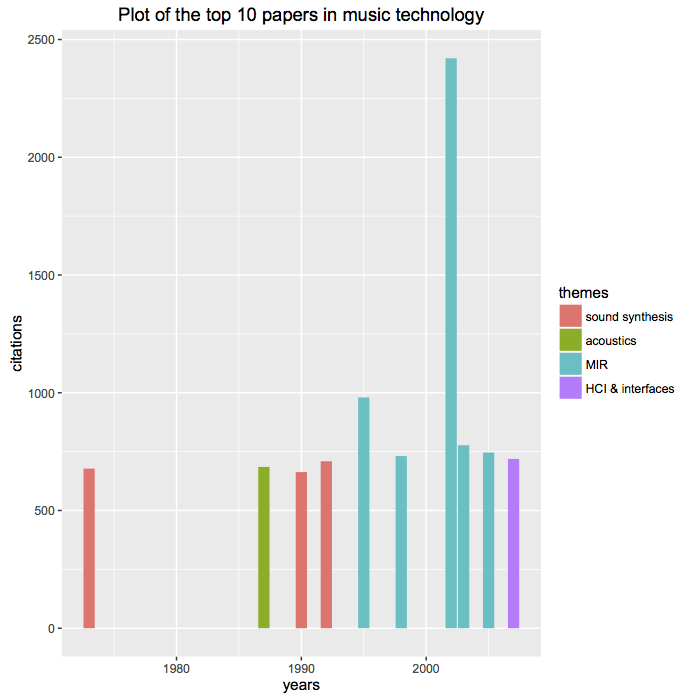 What is the most-cited paper in music technology? A few weeks ago I informally posed this question in social media (Twitter, Facebook). A nice conversation followed up the question, which I will summarize here. Books vs papers The question focuses on articles, as opposed to books. The rationale is to identify the most influencial articles in music technology, which tend to be faster in publishing and are more focused on releasing discoveries and revealing new approaches, if compared to books. Top-cited books that were suggested but are excluded from this group are: Helmholtz (1877): On the Sensations of Tone as a Physiological Basis for the Theory of Music (1651 citations). Roads (1996): The Computer Music Tutorial (1543 citations). Gold, Morgan and Ellis (1999): Speech and audio signal processing: processing and perception of speech and music (892 citations). What is music tech? Music technology is a niche and novel field, if we compare it to math...
Read more
What is the most-cited paper in music technology? A few weeks ago I informally posed this question in social media (Twitter, Facebook). A nice conversation followed up the question, which I will summarize here. Books vs papers The question focuses on articles, as opposed to books. The rationale is to identify the most influencial articles in music technology, which tend to be faster in publishing and are more focused on releasing discoveries and revealing new approaches, if compared to books. Top-cited books that were suggested but are excluded from this group are: Helmholtz (1877): On the Sensations of Tone as a Physiological Basis for the Theory of Music (1651 citations). Roads (1996): The Computer Music Tutorial (1543 citations). Gold, Morgan and Ellis (1999): Speech and audio signal processing: processing and perception of speech and music (892 citations). What is music tech? Music technology is a niche and novel field, if we compare it to math...
Read more
-
TUIs and Tabletops
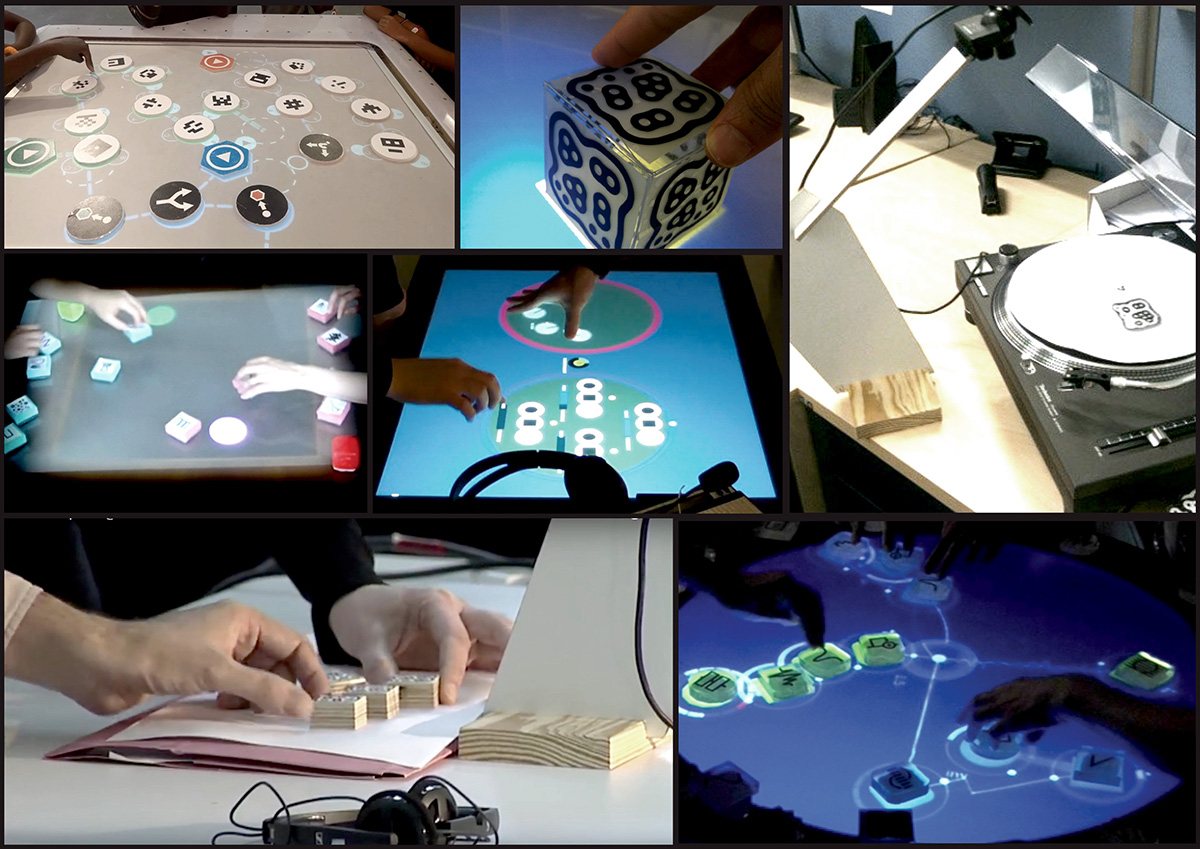 From left to right, and top to bottom: TuneTable (© Georgia Tech), SoundXY4 (© Anna Xambó), Soundscape Turntablism (© Anna Xambó and Gerard Roma), SoundXY2 (© Anna Xambó), TouchTR4CK (© Anna Xambó), SoundscapeDJ (© Anna Xambó and Gerard Roma), The Reactable (© Reactable Systems). Tangible user interfaces and tabletops have been around for more than a decade. There was a big hype in the early 2000s with multitouch interfaces as seen in movies like Minority Report and famous musical tabletops like the Reactable. I did my PhD at the Open University in the UK on how to evaluate and design interactive tabletops for music performance. I conducted two studies with the Reactable, one study in a science museum, and the other study with expert musicians improvising in groups. I also built my own prototype for composing music based on everyday sounds and using a spatialization ambisonics with four speakers. Here at Georgia Tech we are...
Read more
From left to right, and top to bottom: TuneTable (© Georgia Tech), SoundXY4 (© Anna Xambó), Soundscape Turntablism (© Anna Xambó and Gerard Roma), SoundXY2 (© Anna Xambó), TouchTR4CK (© Anna Xambó), SoundscapeDJ (© Anna Xambó and Gerard Roma), The Reactable (© Reactable Systems). Tangible user interfaces and tabletops have been around for more than a decade. There was a big hype in the early 2000s with multitouch interfaces as seen in movies like Minority Report and famous musical tabletops like the Reactable. I did my PhD at the Open University in the UK on how to evaluate and design interactive tabletops for music performance. I conducted two studies with the Reactable, one study in a science museum, and the other study with expert musicians improvising in groups. I also built my own prototype for composing music based on everyday sounds and using a spatialization ambisonics with four speakers. Here at Georgia Tech we are...
Read more
-
Women in Music Tech
 In Spring 2016 I have co-founded the Women in Music Tech organization together with Léa Ikkache and other colleagues at the Georgia Tech Center for Music Technology to sustainably bring more women into the program. My motivation is explained in my diversity statement. Since then, we have been working very hard. We have:
Constituted a WiMT committee with 11 members who meets monthly.
Designed our logo.
Organized a WiMT fall concert & reception, to be held this next Wednesday, November 2, 2016, at the Garage (Tech Square) 7-9pm (free entrance & food).
Launched our WiMT bimonthly newsletter.
We are very excited about it! More actions to come soon, including making the organization sustainable.
Read more
In Spring 2016 I have co-founded the Women in Music Tech organization together with Léa Ikkache and other colleagues at the Georgia Tech Center for Music Technology to sustainably bring more women into the program. My motivation is explained in my diversity statement. Since then, we have been working very hard. We have:
Constituted a WiMT committee with 11 members who meets monthly.
Designed our logo.
Organized a WiMT fall concert & reception, to be held this next Wednesday, November 2, 2016, at the Garage (Tech Square) 7-9pm (free entrance & food).
Launched our WiMT bimonthly newsletter.
We are very excited about it! More actions to come soon, including making the organization sustainable.
Read more
-
My New Website on Jekyll!
I have a new website! I am trying Jekyll for the first time. The content from my previous website has been migrated and updated. Now it should read better on mobile devices. Here is a useful explanation on the benefits of using Jekyll and GitHub to create and host a personal website. Read more